WeeSprout baby feeding jars painted with high-Lead paint: a violation of the Consumer Product Safety Improvement Act, with criminal penalties possible
Five screenshots from the WeeSprout website:
An image of the product tested by Lead Safe Mama, LLC for which the paint tested positive for a high level of Lead. Testing was completed using XRF Technology:
A screenshot of the WeeSprout Instagram page as of 3/10/2023:
[TEXT: “WeeSprout — We offer products that make a healthy day-to-day more doable. Pure. Intentional. Long-lasting.”
When responding to customers concerned with paint wearing off their baby feeding products, WeeSprout has described the paint as “vegetable-based,” “happy,” “healthy,” “eco-conscious,” “pure,” and “intentional”— all the buzz words parents are looking for today … but with a touch of Lead-paint too!]
TLDR CONCERNS:
This is a very long article. This article is full of background information about the issue, science, scientific reports, explanations, and communications to and from WeeSprout customers — in addition to interpretations of the details presented. The length is a nod to the nature of this work. If you don’t have time to read this article because it is too long, I apologize. There are also annoying advertisements interspersed throughout this article. These advertisements help fund the work as no one is paying us to write this summary or file a violation report with the Consumer Product Safety Commission. If someone with means would like to make an incredibly generous $2,500 gift to Lead Safe Mama, LLC in support of this work (gifts are not tax-deductible as we are not a nonprofit), we will remove the ads from this article so anyone interested in reading it can do so ad-free. Absent a contribution along those lines, the (approximately) one penny per page view we earn through advertising income on the site (directly tied to the readership of what we write) is necessary, as it covers the costs of the work we do here — including the costs of our legal team (a fundamental and necessary expense).
Ways to contribute in support of this work:
March 10, 2023 — Friday
Note: if you own these products and are interested in finding safer choices, click here.
Article Index
- Section #1) Introduction to Lead Safe Mama, LLC & Tamara Rubin
- Section #2) June 2022 XRF test results for the product in question: WeeSprout glass baby food jars with white painted logo and measurement markings
- Section #3) How much Lead is too much Lead (in the paint or measurement markings of an item intended for use by children)?
- Section #3A) Which products are contaminated, specifically
- Section #3B) Point of further concern; interchangeable tops
- Section #4) Discussion of the issue based on June 2022 findings. How was this potentially a problem if the Lead paint is only on the outside of the product?
- Section #4A) What should families who own these products do now?
- Section #4B) Some Lead-free alternative products
- Section #5) November 2022 Communications between WeeSprout and a concerned customer
- Section #6) March 2023 Communications between WeeSprout and a concerned customer
- Section #7) Flawed “Independent” testing of these products shared by WeeSprout with customers
- Section #7A) Simplified discussion/explanation of the “certification” report:
- Section #8) CPSC Violation Report (to be filed March 11, 2023 — Saturday) including a possibility of criminal penalties for the company
Section #1) Introduction to Lead Safe Mama, LLC & Tamara Rubin
For those new to this website:
Tamara Rubin is a multiple federal award-winning independent advocate, activist, and documentary filmmaker. She is the owner and founder of Lead Safe Mama, LLC — a woman-owned small business for consumer goods safety and childhood Lead-poisoning prevention. She is also a mother of Lead-poisoned children, who are the inspiration for her work (Tamara’s sons were acutely Lead-poisoned in August of 2005). She was trained and certified to use XRF technology in 2009 — specifically with a focus on testing consumer goods for toxicants.
- Tamara was the parent advocate responsible for finding Lead in the popular fidget spinner toys in 2017.
- In 2022, her work was also responsible for three CPSC product recalls — the Jumping Jumperoo recall (June 2022); the Lead painted NUK baby bottle recall (July 2022); and the Leaded Green Sprouts Insulated Stainless Steel Baby Bottles (November 2022).
- In 2023, her work was featured in Consumer Reports Magazine and has already (as of the date of publishing this article) precipitated a product recall for one of “Oprah’s Favorite Things”: the Bindle Bottle insulated stainless steel water bottle.
- To see a summary of violation reports filed by Lead Safe Mama, LLC — as well as recent press coverage of our work — please click this link.
The XRF instrument Tamara uses is the same instrument (and same scientific method) as is used by the U.S. Consumer Product Safety Commission (CPSC) to test consumer goods for toxicants (specifically heavy metals), including Lead, Cadmium, Mercury, Antimony, and Arsenic. All test results reported on this website (LeadSafeMama.com/TamaraRubin.com) are science-based, accurate, and replicable. All components of the items reported on this website are tested multiple times to confirm test results. Please click through this link to learn more about the testing methodology used for the test results discussed and reported on this website.
Section #2) June 2022 XRF test results for the product in question: WeeSprout glass baby food jars with white painted logo and measurement markings
In June 2022, I was hired by a family who had a mysterious case of Lead poisoning with their infant. The thing I personally remember most about this little one is that she was scooting still, (not quite crawling and not anywhere near walking). I had recently painted my toenails and — since I take my shoes off when entering families’ homes — the baby spotted my brightly colored nails right away (just at her level!) and was fascinated with them, trying to grab at my toes through her playpen wall as I sat chatting with her parents about the potential sources of Lead exposure for their daughter.
This is an odd anecdote to share, but I want to illustrate that this was a VERY YOUNG CHILD! She lived in a fully-renovated/updated mostly newer construction home with no construction-based Lead-hazards (specifically, no concerns for paint-based hazards that one might find in a pre-1978 home). This child was also not a candidate for having been exposed at school or daycare. After a thorough examination and exploration of her home, alongside the daily routines of her family, it became clear the exposure was likely coming from her food supply — the most likely culprit being Lead-contaminated food contact kitchenware. In working with this family to find potential sources of Lead exposure, we carefully reviewed her kitchen and one of the three potential sources we found was WeeSprout reusable glass baby food jars — which the family uses daily for storing breastmilk and baby food.
The XRF test results for the painted areas of the WeeSprout brand glass reusable baby food jars are pictured below from one 30-second reading set:
- Lead (Pb): 3,234 +/- 116 ppm
- Cadmium (Cd): 53 +/- 8 ppm
- Mercury (Hg): Non-detect
- Bromine (Br): Non-detect
- Chromium (Cr): Non-detect
- Iron (Fe): 244 +/- 140 ppm
IMPORTANT NOTE: Given the fact that the XRF testing of these jars was done in June of 2022, the jars in question (which we confirmed are painted with high-Lead paint) were purchased (and therefore manufactured) at some point prior to June of 2022.
Upon discovering that these WeeSprout reusable glass baby food jars were positive for high levels of Lead in the paint, I shared this preliminary finding on the Lead Safe Mama Instagram page (along with a photo showing the XRF reading of the product). Multiple Lead Safe Mama social media followers/community members proceeded to do what this community does best and tagged the company on social media to help make sure they were aware of the issue. Here’s a screenshot of that Instagram post from June 24, 2022. If you click the screenshot it will take you directly to the post on Instagram where you can read the comments made by members of the Lead Safe Mama online community — including those where the company was directly tagged:
Section #3) How much Lead is too much Lead (in the paint or measurement markings of an item intended for use by children)?
All U.S. Federal agencies (and other public agencies like Unicef and the American Academy of Pediatrics) agree that there is no safe level of Lead exposure. In an effort to limit potential exposure to children, the CPSC had legislated that the limit of Lead in the paint, coating, or glaze of an item intended for kids’ usage should not exceed 90 ppm. The base material, or substrate (such as glass, plastic, metal, etc.), of items intended for children’s use must meet the limit of 100 ppm Lead.
As you can see from the XRF test results for the WeeSprout jars in Section #2 above, the painted coatings (measurement and logo markings) on these jars read in at over 3,000 ppm Lead. A 3,234 ppm Lead reading works out to more than THIRTY-FIVE (35) times the amount of Lead that would be considered illegal in an item like this.
While the CPSC and the WeeSprout company might argue that these reusable glass baby food storage jars should not be considered items intended for use by children (that the intended user is parents, not kids), this perspective is not borne by the practical daily use of these products in people’s homes across the country. Children are often given their snacks or other food directly in these containers. These glass WeeSprout jars also come in multiple sizes, with one size commonly used by parents for their children to drink from. Similarly, the products are marketed in bright colors meant to be attractive to children and are specifically promoted with language indicating they are intended for babies and young children. Consider the company’s phrase, “The perfect size for little hands,” as an example.
So — taking into account both relevant criteria of the Consumer Product Improvement Act of 2008 [1) the level of Lead found in the coating and 2) the intended use of the product] these products are illegal and should be recalled.
Section #3A) Which WeeSprout reusable glass products are contaminated, specifically?
In addition to the Lead-contaminated WeeSprout products that we tested (pictured above), we have also tested some examples of these WeeSprout reusable glass feeding jars that appeared to be negative for Lead traces in the paint. Finding this result likely points to a batch-specific issue. Yet with non-Lead painted markings being identical to those with Lead paint, the consumer is left unable to tell the difference between versions; as the company has not issued any public statement/recall, people should hold off from using all reusable glass WeeSprout products with white painted logos until it has been determined which batches are impacted. Lead Safe Mama has also purchased several of these products (in March 2023) directly from the WeeSprout store on Amazon and will be testing and reporting on them to determine if currently available stock (in the various models/sizes) is painted with Lead paint. The only confirmed data points we have at this moment (to help isolate which batches may be impacted) are as follows:
- The WeeSprout jars pictured above were tested by Lead Safe Mama, LLC (using XRF technology) and were found to have high-Lead paint. The items were purchased and manufactured before June of 2022 (as they were tested in June of 2022).
- A WeeSprout customer (and Lead Safe Mama community member) purchased a new set of jars with painted logos and measurement markings directly from the company website in December 2021. The jars were positive for Lead paint according to testing done via an EPA-approved reactive agent home test kit with a low threshold of detection at 600 ppm Lead. (Please see section #6 below for images of the product tested). These items were listed in the company’s “Matte” color scheme and included the pink and gray colored plastic tops seen in the image below.
Section #3B) Point of further concern — interchangeable tops:
The tops of these products are interchangeable. Meaning, if a family purchased multiple variations of these products (like different sets with different colored tops), AND, if it turns out that only the jars sold in the matte sets were painted with high-Lead-contaminated paint, then the family that bought both color schemes would not know after one or more uses which jars had originally come with the primary colored tops versus which came with the matte colored tops given the sets would likely end up mixed together.
Just as the jars tested by Lead Safe Mama, LLC were all jumbled together, with a variety of different colored tops, we expect this is a possible and common scenario explaining why some of the jars were negative for Lead while others were positive. This speaks to both the need for further identifying the impacted batches and also to a comprehensive recall of all WeeSprout’s painted products purchased within whatever date range is determined to be impacted, given the product’s frequent practical use and the potential for products with different colored tops to be mixed together in normal use as intended.
The images below are from Amazon as of (3/10/2022):
 *Amazon links are affiliate links. If you purchase something after clicking on one of these links we may receive a small percentage of what you spend at no extra cost to you. With this and other similar articles, we are not sharing these links to encourage you to purchase these products. Please do NOT purchase these products. We are sharing these links to demonstrate that the products are (in fact) still available for sale on Amazon as of this article’s publication.
*Amazon links are affiliate links. If you purchase something after clicking on one of these links we may receive a small percentage of what you spend at no extra cost to you. With this and other similar articles, we are not sharing these links to encourage you to purchase these products. Please do NOT purchase these products. We are sharing these links to demonstrate that the products are (in fact) still available for sale on Amazon as of this article’s publication. 
Section #4) Discussion of the issue based on June 2022 findings. How was this potentially a problem if the Lead paint is only on the outside of the product?
In reporting these types of findings, (which we have done all too often for baby feeding products painted with Lead-paint) we are commonly asked how the issue of Lead “only on the outside” of a product can present a Lead poisoning risk for children if the paint is in fact not on the food contact surface of the product itself (or, the interior of the vessel). We have an entire article dedicated to answering this question if you follow this link, but here are a few of the most important points highlighted below:
- Children’s hands (and little fingers) grasp the outside of the containers when they are eating or drinking from them.
- These painted logos are prone to wearing off, when the paint wears off it can wear off onto the child’s hands or into the family’s food preparation/kitchen environment.
- It is normal for children to have hand-to-mouth activity, especially when eating (this includes otherwise innocuous normal behavior like licking food off their fingers).
- If they have microparticulate Lead on their fingers and then they lick their fingers, they ingest that Lead.
- It just takes a microscopic amount of Lead to poison a child.
Section #4A) What should families who own these products do now?
If you own any of these WeeSprout glass baby feeding products here is our recommended course of action:
- Set your products aside in large plastic ziplock baggies (along with the lids) until we get further information about a recall and/or which batches are potentially impacted.
- Find your receipt (digital or paper) and save that as well so you can demonstrate proof of purchase if a class action lawsuit or other legal action might require that documentation. You can of course also use that information to demand a refund or paint-free replacement product from the company.
- If you typically wash these items with your other dishes in the dishwasher, a rewash of any item that may have been washed with these (and any other) potentially Lead-contaminated products is not an unreasonable thing to do. Luckily, the surfactants in most standard dishwasher detergents do a good job of removing Lead from surfaces. If you typically use a more natural detergent brand you might want to switch to a more mainstream brand for a few loads as they have better surfactants (better specifically for the purpose of removing Lead contamination) than “natural” detergents. (These come in scent-free and dye-free versions, so a scent-free, dye-free version of a mainstream surfactant-containing detergent is a good option to remove Lead from surfaces.) You may want to run the dishwasher empty first (with detergent) to make sure you are starting with a clean slate when re-washing your dishes.
- If your child has not yet had a Blood Lead Level (BLL) test from their pediatrician (or if they have not had one within the past six or eight months) it would be a good idea to get them tested. It’s always good to have a baseline and to rule out any potential exposure. You can read more about Blood Lead Testing at this link. Children should be tested at least annually through their teen years. I always recommend children first get tested just before they start crawling (at seven or eight months old) and then again shortly after they start crawling (around 15 to 18 months old). Doing this ensures you have a baseline for making sure your home does not have significant Lead dust hazards at child height, or on the floor accessible to crawling babies.
Section #4B) Lead-free alternative products
In addition to testing results for a full range of products published here on LeadSafeMama.com/TamaraRubin.com, please check out the website menu or use the search bar at the top of any page of this site to search for the brand you are interested in using. We have tested hundreds of similar products (both for baby food storage and other baby feeding applications) and we post only 100% Lead-free choices on our shopping website at www.ShopLeadSafeMama.com. Here are the relevant pages on that website:
Sections #5 & #6) Feedback from Lead Safe Mama Community Members
Before I dig into section 5 and section 6 (the two sections below which include communications shared with me by WeeSprout customers who also happen to be members of the Lead Safe Mama online community) I want to address a factor amounting to an elephant in the room for me. I have shared this issue with WeeSprout products many times in the past year (on Facebook and Instagram) but have not yet filed a CPSC violation report nor written up a comprehensive article like I am doing here now.
The WeeSprouts issue has been on my list of companies to report to the CPSC as a CPSIA violation for months, however, that list seems to grow every day and given the relatively small size of this business (Lead Safe Mama, LLC) we have not been able to keep up with the violation reports for products we find that test positive for Lead.
We actually rely fairly heavily on the outrage (and public feedback) of our social media community to help urge these companies into taking action; once we share these findings publicly we hope the companies will feel the heat from their customers and do the right thing. Given nearly nine months have passed since I first reported this publicly on Instagram (a post in which Lead Safe Mama community members tagged the manufacturer of the product), and given there has been no response that I am aware of from the company since then, we decided it was time to push this to the top of our “to-do list.” We heard from two more Lead Safe Mama readers on March 10, 2022, with their stories (stories which each included dismissive and factually incorrect statements/communications/documents they received from WeeSprout representatives.)
Section #5) November 2022 Communications between WeeSprout and a concerned customer
The initial email from the customer to WeeSprout:
[TEXT: Sent: November 18, 2022 at 10:42
Good morning, Hope this email finds you well. Throughout the past year, I have purchased several sets of the 4 and 8 ounce glass baby food jars with the lids. Recently the white markings on the outside of the container have started to fade and are easily scratched off. It sparked a question in me in that I do not know what this white etchings are made from. May I please have the certificate of analysis and composition of the white markings on the outside of the glass baby food jars? Thank you]
The initial response from WeeSprout:
[TEXT: Sent: November 18, 2022 at 12:39
Hi — Thank you for contacting us! I’m sorry you’re having issues with the labels rubbing off. We had a problem with our production site temperature, which caused the ink of a recent batch of jars to dry improperly. Some of the vegetable based labels are coming off when washed. Thankfully this doesn’t affect the integrity of the jars, but I am so sorry for the inconvenience. I’ve attached our certification, so you can take a look! We actually just updated our jars to have raised glass instead of the labels. Would you be interested in a replacement set? We’d be happy to send some! We just need your order number and preferred address. 🙂
All the best, Charity, WeeCare Team]
A second email from the customer to WeeSprout:
[TEXT: Sent: November 18, 2022 at 13:12
Thank you Charity for the speedy reply! It is such a wonderful thing to have a company be so transparent. I am having somebody help me interpret the results that is well versed in reading the certificate of analysis. Thank you again. I purchased the 3 sets on the dates as follows, please see attached picture. If you need any further information from me, I would be happy to provide.]
Second response from WeeSprout:
[TEXT: Sent: November 18, 2022 at 8:18:24 pm
Hi — Absolutely! Would you like us to send some of the raised glass jars or to issue a full refund on your order? We can wait if you want to check back once you take a closer look at the tests!
All the best, Charity, WeeCare Team]
Section #6) March 2023 Communications between WeeSprout and a concerned customer.
The initial email to WeeSprout from the customer:
[TEXT: Sent: March 10, 2023 at 12:16
I purchased your baby jars in 2021 and have been using them for my children’s food. I just tested them with an EPA recognized Lead kit (3M) after reading several customers discovers that the white writing on the side (of) the glass contained Lead. When I tested it immediately turned bright pink/red, indicating that there is a high amount of lead present. This is incredibly concerning and I am so upset that I have been washing these with all of our dishes and feeding to my kids/having them touch them while eating. Please refund my money immediately and issue a recall of this product immediately. You have Lead paint in your products at illegal levels and you are harming children. ]
Photos provided by the customer with these communications:




The response email from WeeSprout to customer:
[TEXT: On Mar 10, 2023, at 12:54 PM, WeeSprout wrote:
Hi — Thanks for reaching out to us. I am sorry for the confusion. Because trace amounts of Lead are in almost all substances, “lead free” just means so low it is not detectable, which is how all products are tested and screened (not just paint).
We have our jars tested each time before shipping, and we also have had them re-tested by a local lab here in Memphis, TN, where we design all of our products. The result was the same, which was that any Lead detection is well below the threshold deemed lead-free by the CPSC standard. This would apply to any child product in your home as long as it is FDA and CPSC approved! Most of our team consists of moms, and we use the jars daily in our homes–we would never recommend something we don’t stand behind. Also, we have issued a full refund for your jars. Please let us know if we can help you with anything else! Please let us know if we can answer any more questions. All the best, Kelly, WeeCare Team]
Final response email to WeeSprout from customer:
[TEXT: March 10, 2023 at 1:02:40 PM
There is no way it is a super low amount – it immediately turned bright pink when I just barely swabbed it. I have tested lots of items and the only thing to ever do something similar was antique China that I knew had a high amount of Leaded paint. Are you saying every single jar is tested before shipment? Will you please provide me with the results? Was this process done in 2021? Because clearly my batch has a high amount of Lead.]
Section #7) Flawed “Independent” testing of these products shared by WeeSprout with customers
In the following, you will find a link to a full copy of this report and screenshots of the relevant sections. Below these images is a brief conversation as to why this testing and certification is insufficient and irrelevant.
Full Report:
Page 2 of 7
Section 2 – Page 4 of 7
Section 4
Page 6 of 7
Sections #7A) Simplified discussion/explanation of the above “certification” report:
- This report was provided via email to the customer who made the inquiry in November of 2022 (because the paint on the exterior of her glass WeeSprout jars was deteriorating).
- The date on this report is April 29, 2020.
- The known purchase date of Lead-contaminated samples from this company was purchased in 2021 (so even if the certificate and testing were legitimate, this testing is not necessarily relevant for products manufactured or sold in 2021 and 2022).
- There is no statement on the report indicating that the reporting agency (AGC) is a CPSC-accredited laboratory and I could not find their CPSC accreditation certificate or documentation on their website (although they do mention being a CPSC-accredited lab on their site).
- The only total Lead content testing apparently done (for CPSIA compliance) is for the SUBSTRATE (as noted in section 2 of the report, on page 4).
- There is no mention of the painted exterior coating of the product in any section of the report.
- MOST IMPORTANT: This report does not have any section regarding testing the paint on the outside of the jar for total Lead content in order to determine compliance with the CPSIA’s paint limit regulation, inferring that apparently the paint was never tested.
What we are left with is a company that was informed in June of the Lead in their paint, yet insisted in November (five months after they were made aware of this concern) that their paints are “vegetable based.” WeeSprout was alerted by consumers about the concern for Lead in their paints yet apparently did not proceed with any follow-up testing to determine if this was the case. OR, if WeeSprout did perform follow-up testing, it kept results from consumers requesting that testing and instead provided testing that was more than two years old, dated April 2020. This would indicate testing that was insufficient, inappropriate, and from a lab that specifically neglected to test the paint on the exterior surface of their product (neglecting a key point required to determine CPSC compliance).
We can “feel sorry” for this business. We can give them the “benefit of the doubt” and assume they had no idea their products tested positive or never saw the alerts from their customers on the post with our testing from June of 2022, in which they were tagged. We could also assume they independently prompted a switch to unpainted glass (and not that they initiated this switch due to concerns about Lead in their paint). Though none of this makes sense when WeeSprout easily could have purchased a LeadCheck swab for $10 at a local hardware store and tested their paint themselves (with an understanding that the low threshold of detection for the LeadCheck swab is 600 ppm). They also could have contacted Lead Safe Mama, LLC directly to ask about my findings. WeeSprout did not take any of these actions. We will publish more data points as soon as other samples we ordered from the WeeSprout store on Amazon arrive and can be tested.
Section #8) CPSC Violation Report (to be filed March 11, 2023 — Friday) with possible criminal penalties for the company
A CPSC violation report has been filed as of March 11, 2023. The report will be linked here soon. It is important to note that even though in recent communications with customers the company claims it has switched to an unpainted product (with raised measurement markings instead of paint), their painted products are still in use in homes today and appear to still be available for sale in certain locations — including Amazon if the Amazon advertising images shown above are to be taken at face value.
Given the nature of the product, which the company specifically espouses as being “long-lasting,” without a highly visible public recall these jars will continue to be used by families for years to come. Even if the company asserts there is no longer a concern because they have stopped this manufacturing process, they should still be required to issue a highly public and visible recall as well as send notices to their customers about the concern for high levels of Lead in the paint on these products.
Also important to note: It seems plausible the company has been aware of the Lead in the paint on their products (likely since the initial publication of our test results on Instagram in June of 2022) and has been possibly hoping to avoid the controversy and cost of a public recall of their Lead-painted baby feeding products by quietly switching to unpainted products and not informing the public of the concern for Lead in products sold through 2022. The fact that they informed a customer of their “recent” switch to paint-free markings in November of 2022 supports our theory that they switched to paint-free after learning of Lead Safe Mama, LLC’s findings. It is in fact illegal — a violation of the CPSIA — for them to not have quickly or immediately self-reported the concern for Lead paint in their products when first made aware of the concern. This violation is potentially subject to criminal penalties (see the first image below). We will be bringing this point up in our violation report.
Final note: This is not the only recent demand for a WeeSprout recall. The second image below shows another WeeSprout product recalled in February 2023. We just discovered this during research for this article. Given they are now obviously aware of the recall process, we are “extra” surprised that no public action has been taken on finding Lead on their glass baby feeding products.
Another WeeSprout recall earlier this year (February 9, 2023):

Never Miss an Important Article Again!
Join our Email List








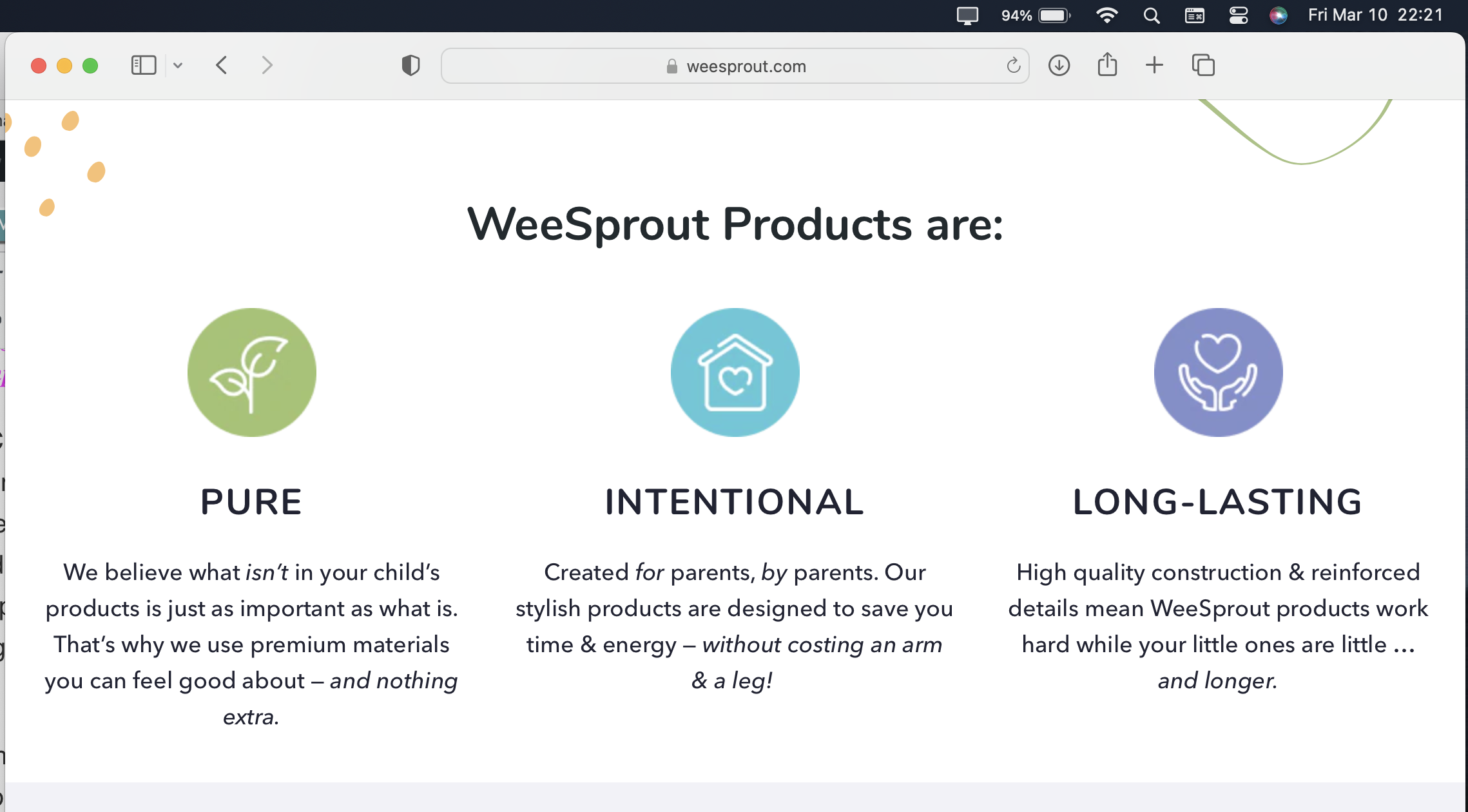
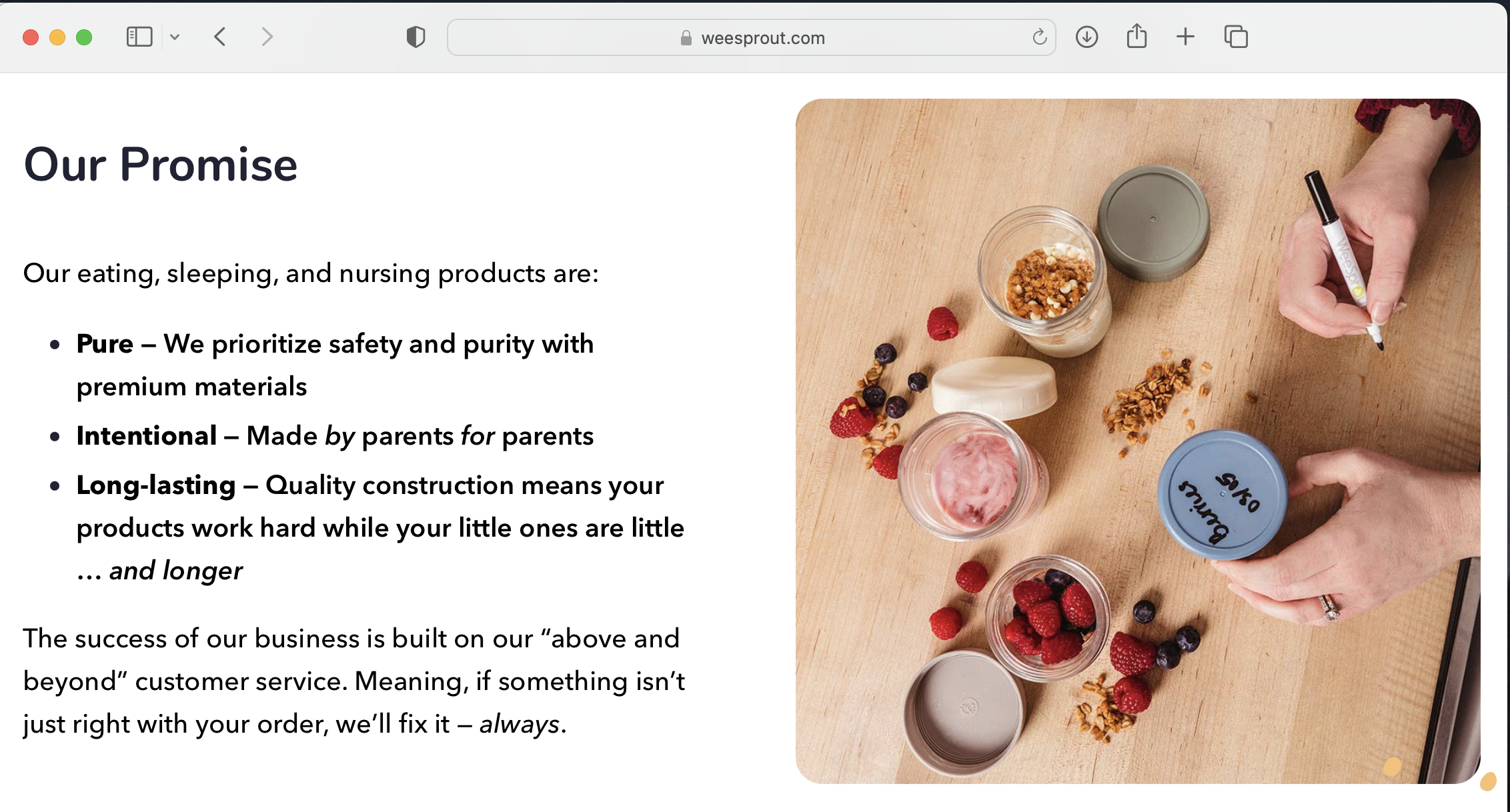
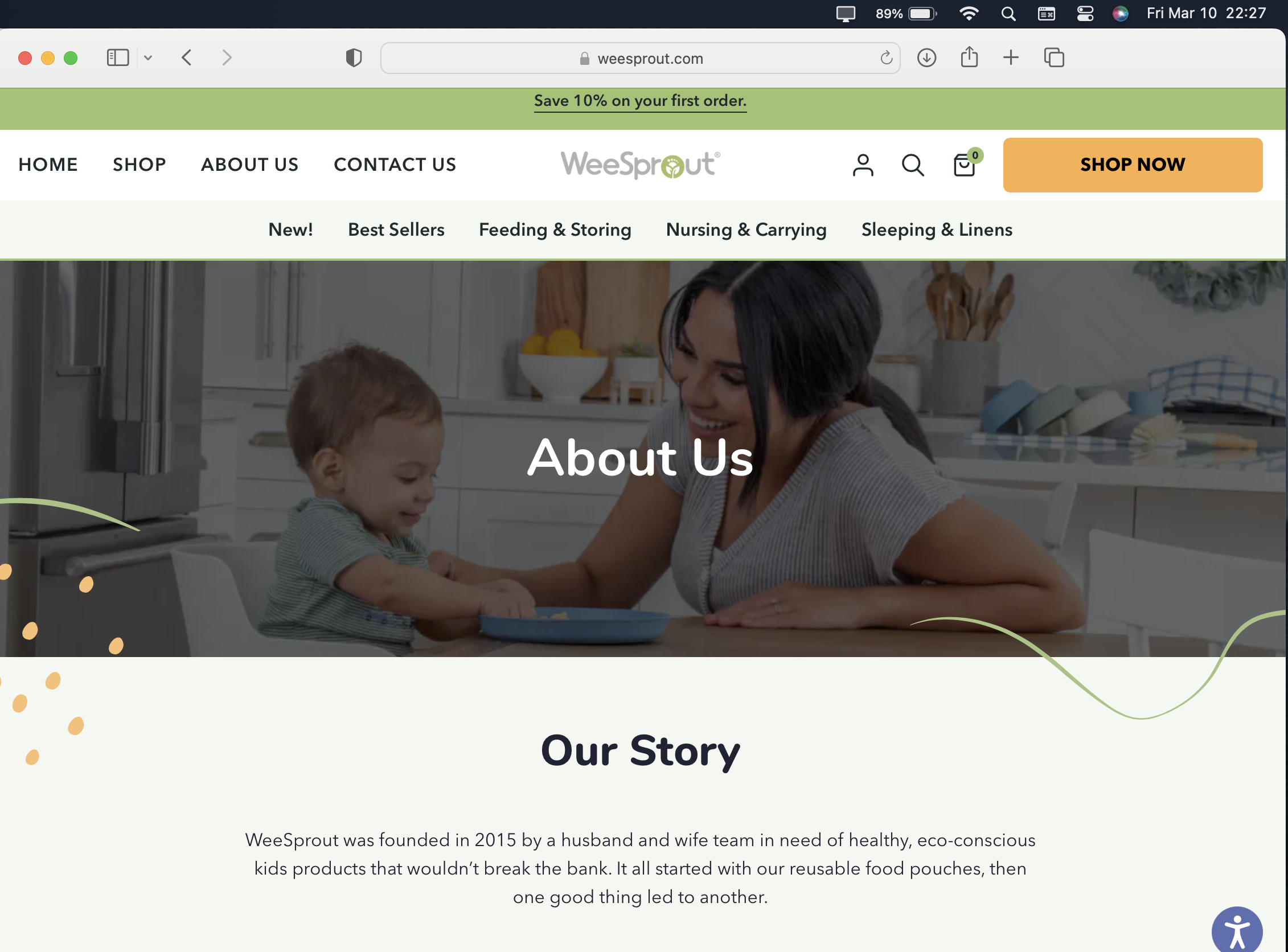
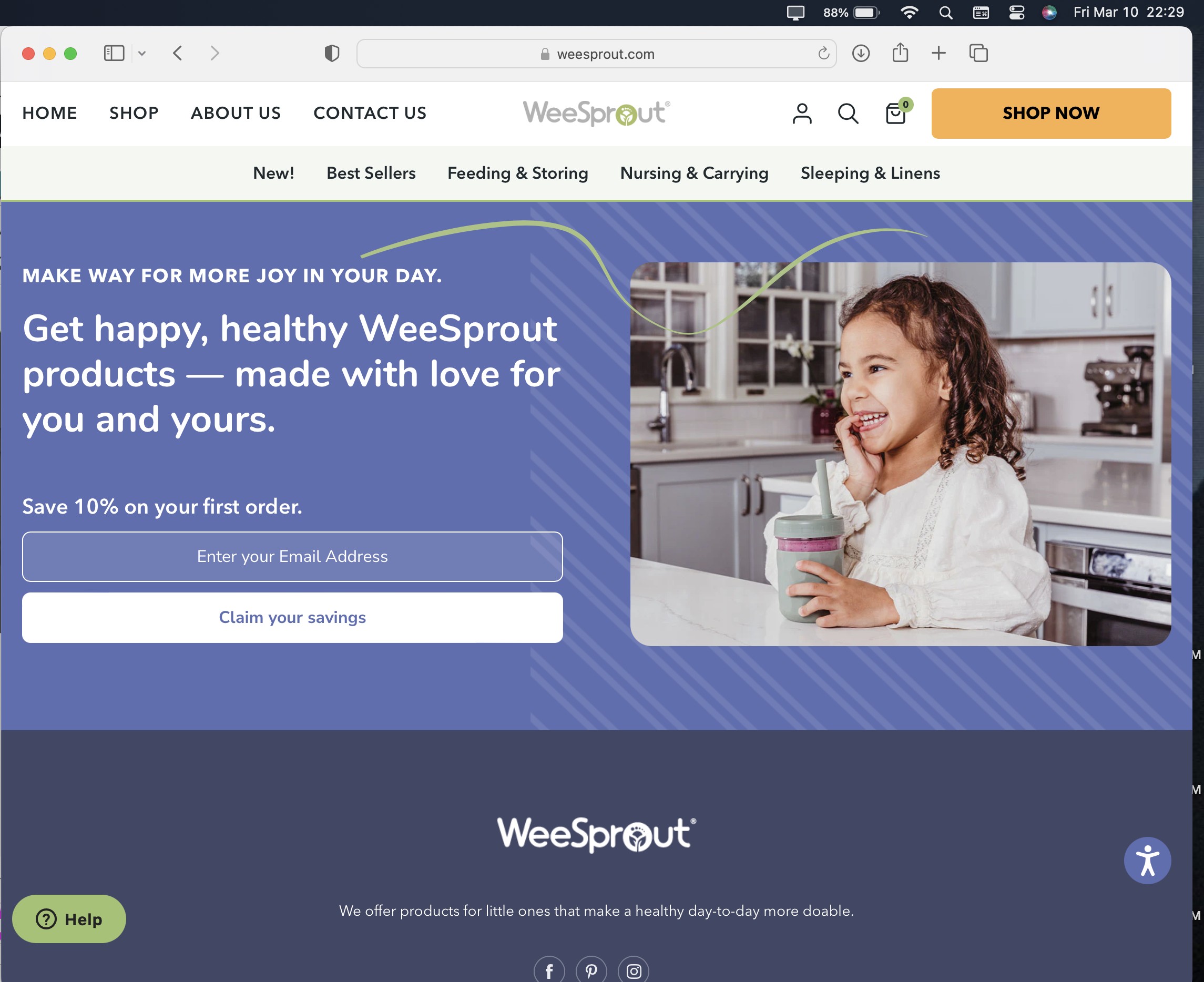
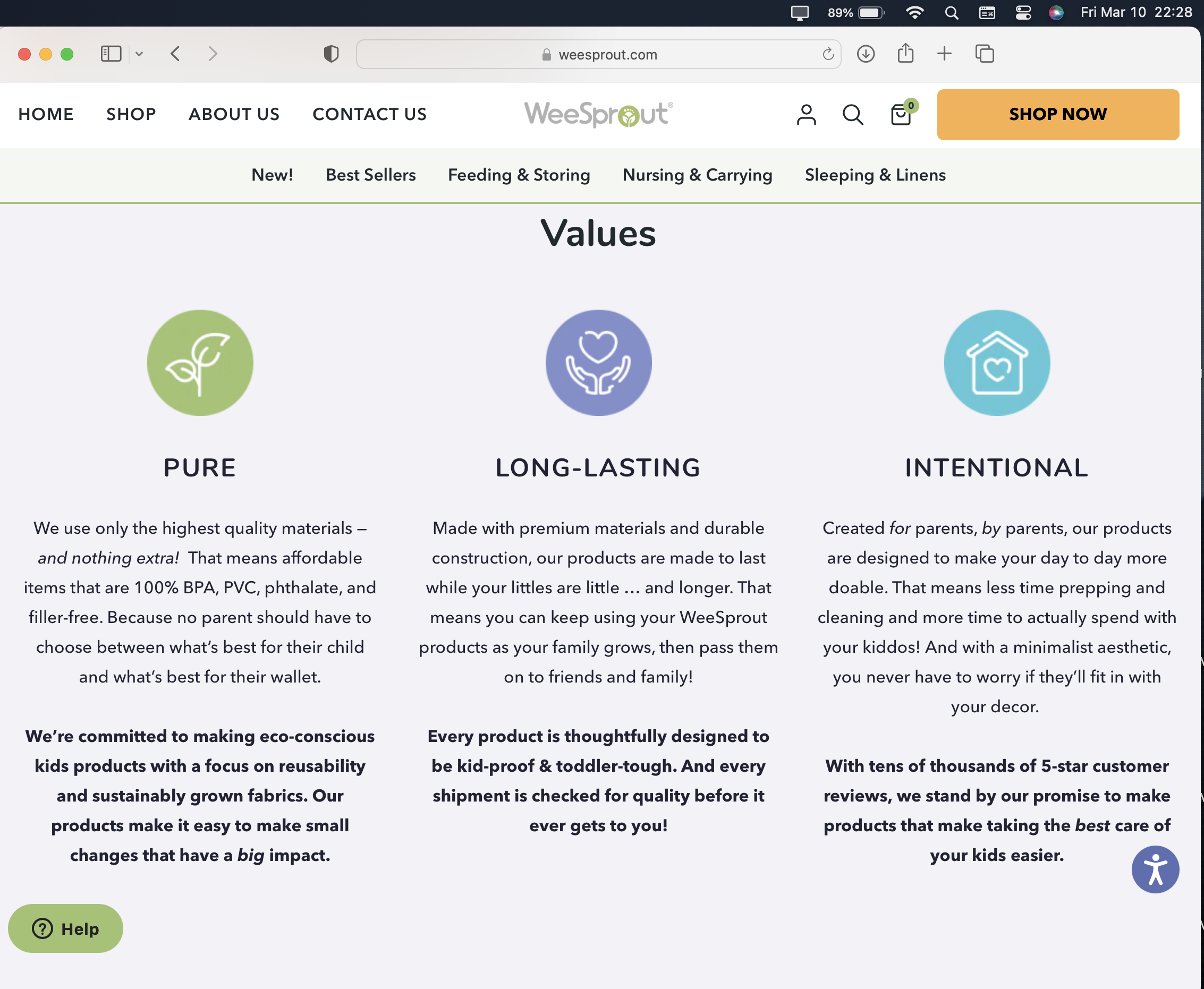
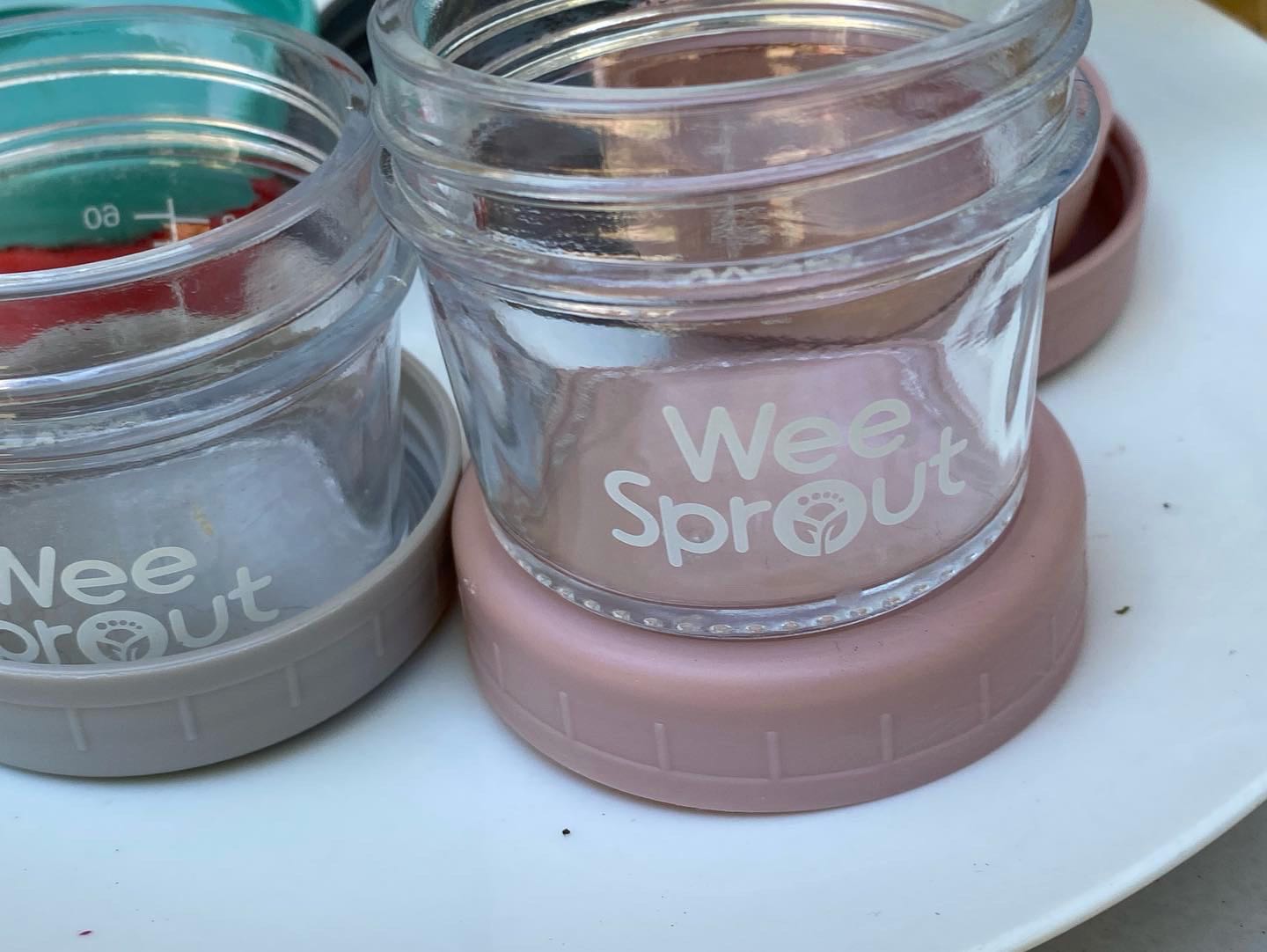
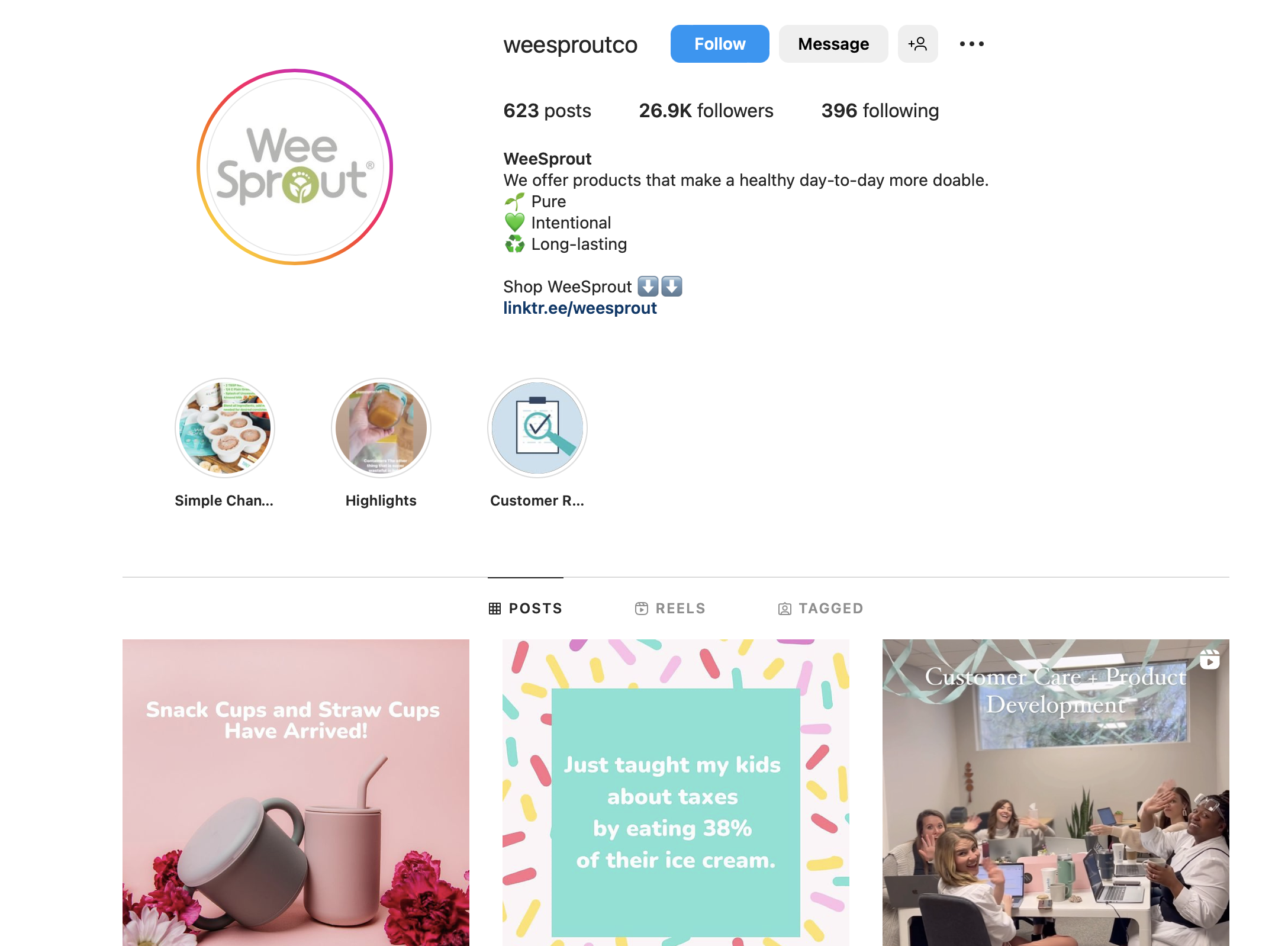
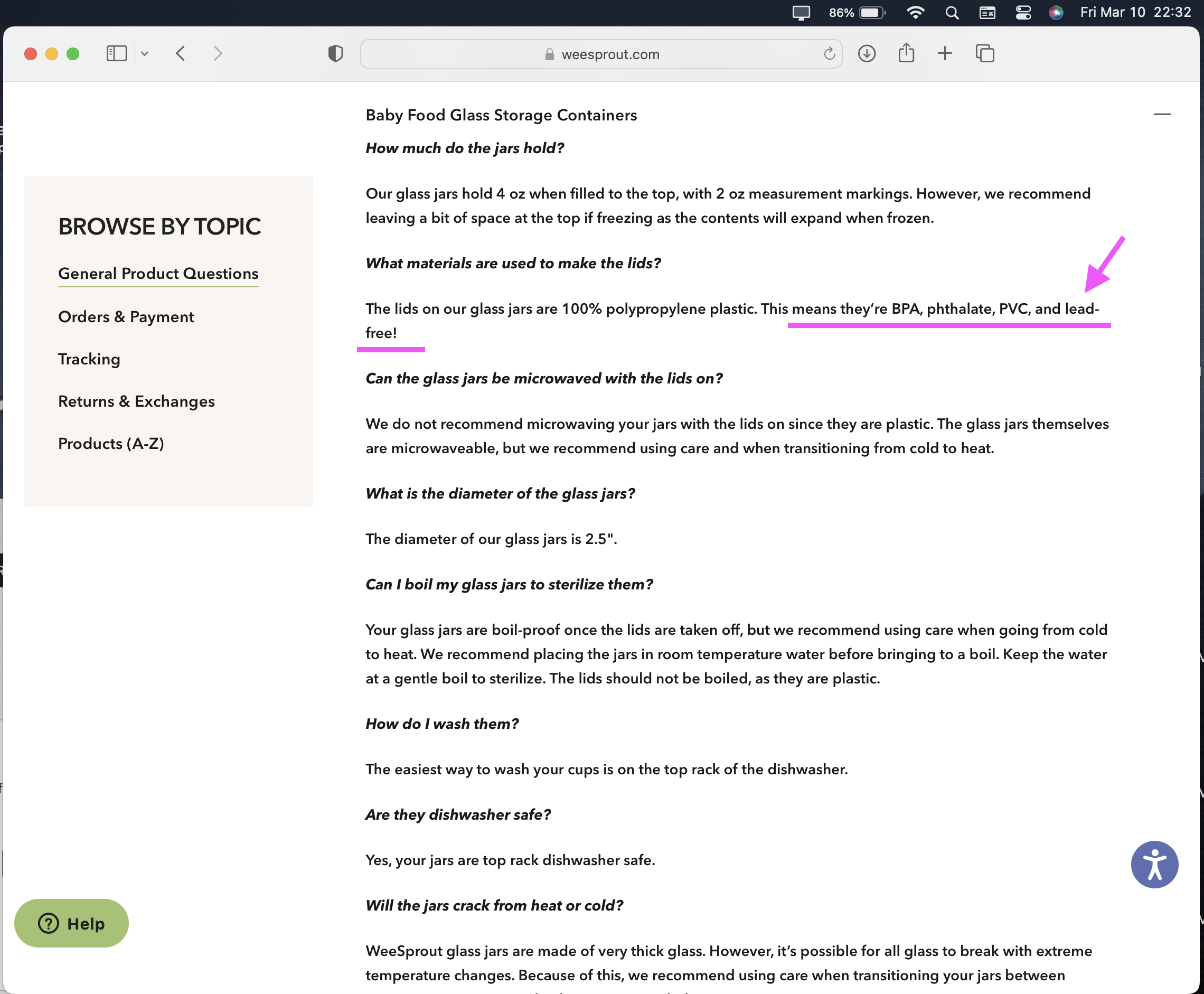

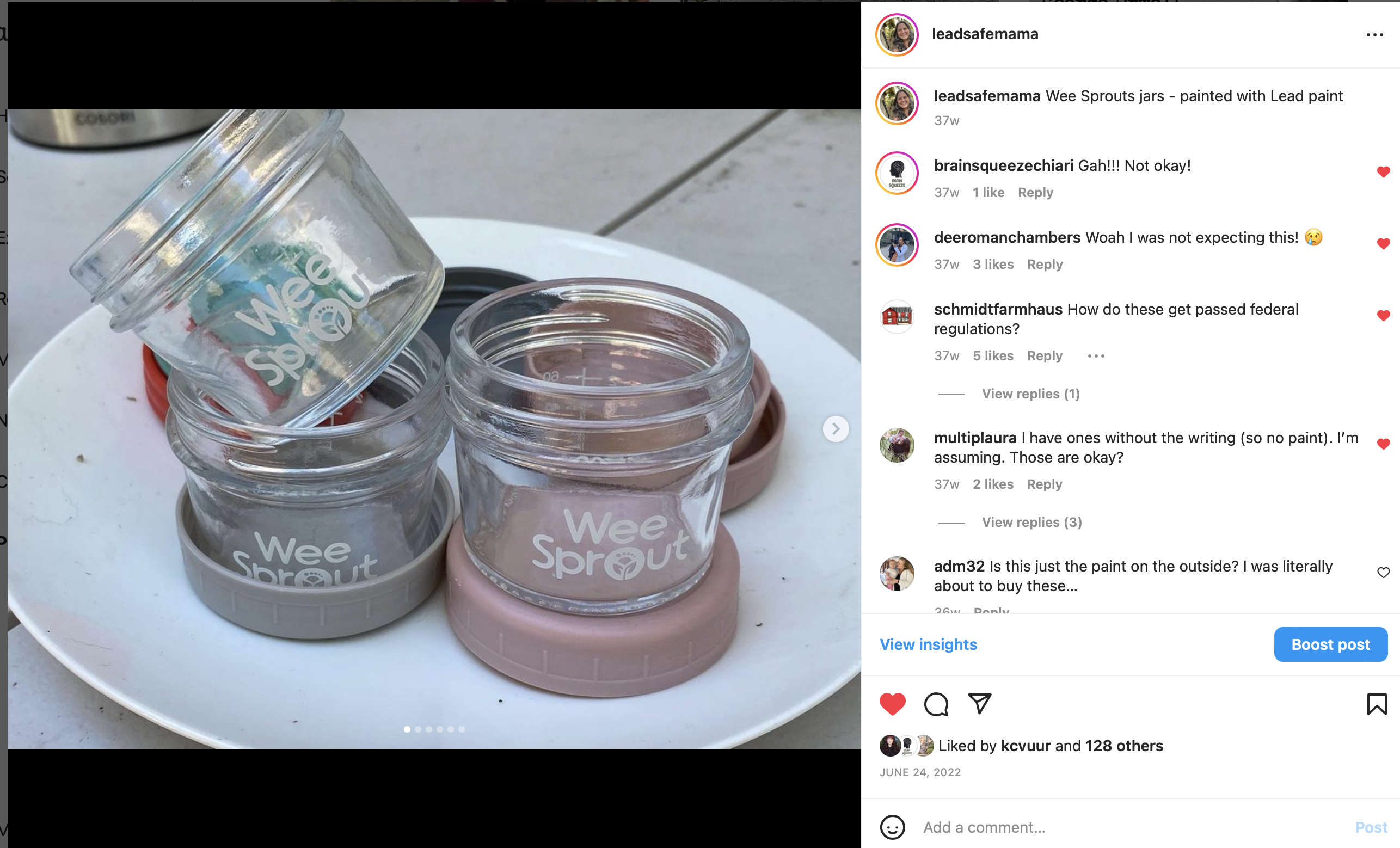
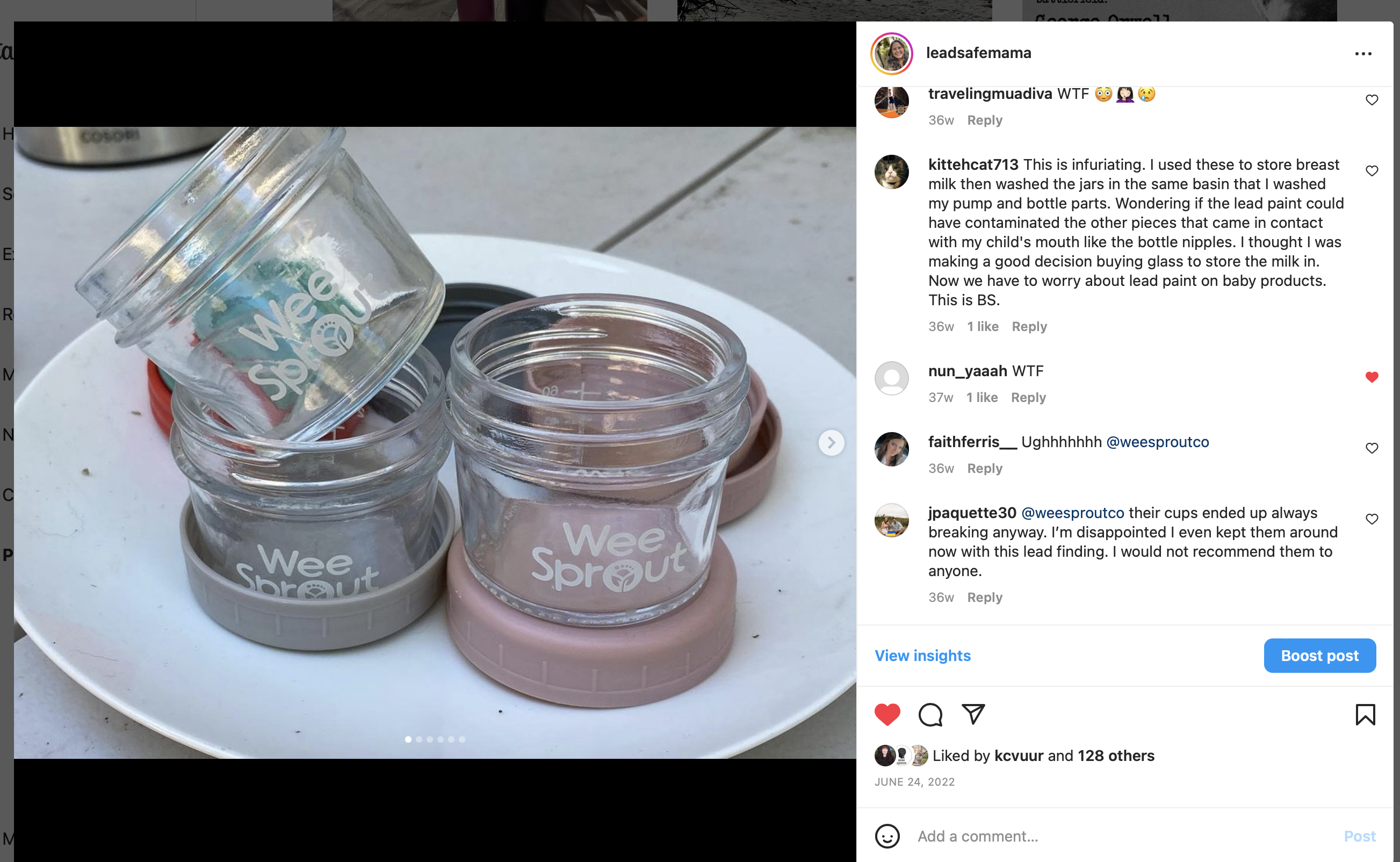
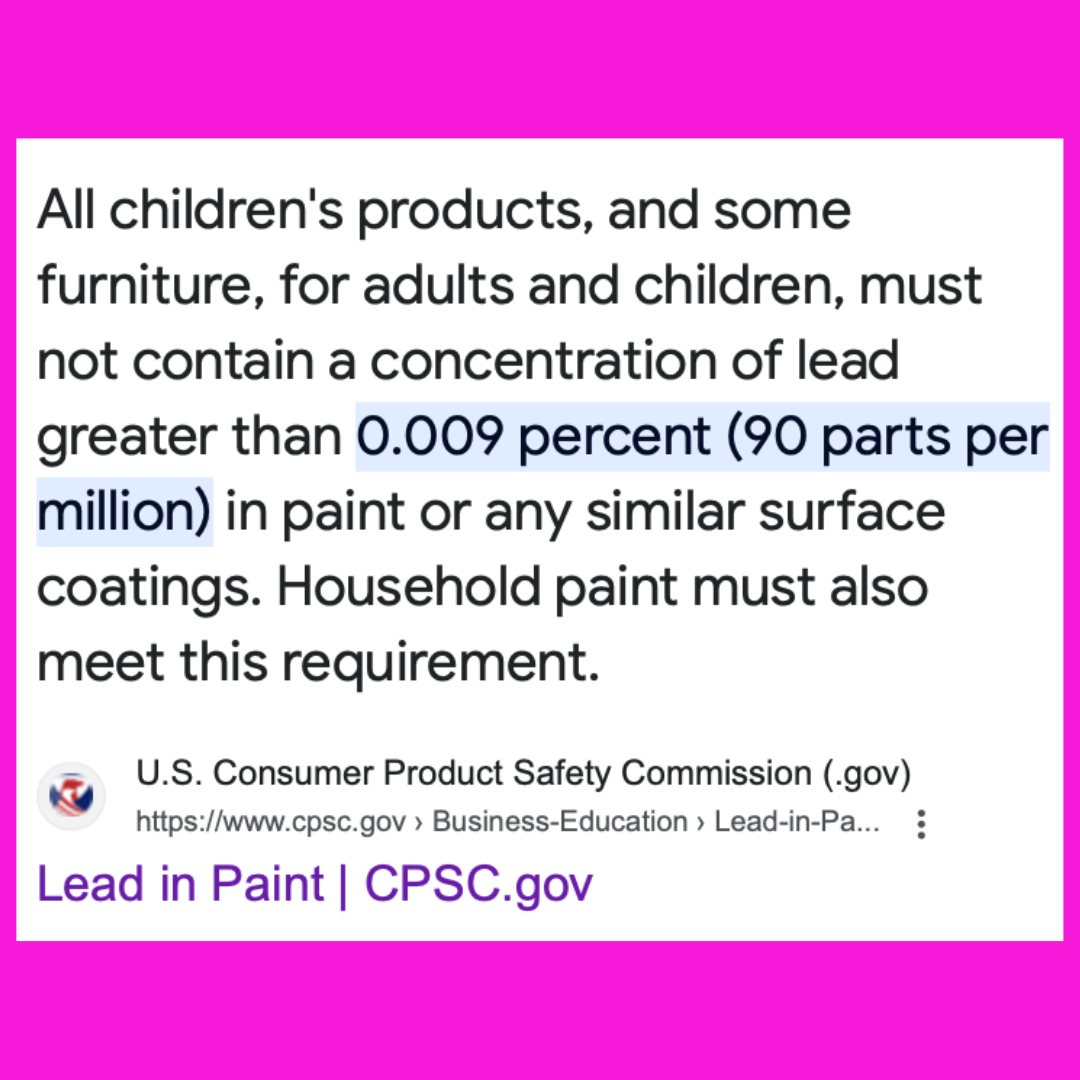
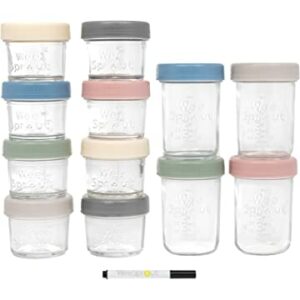
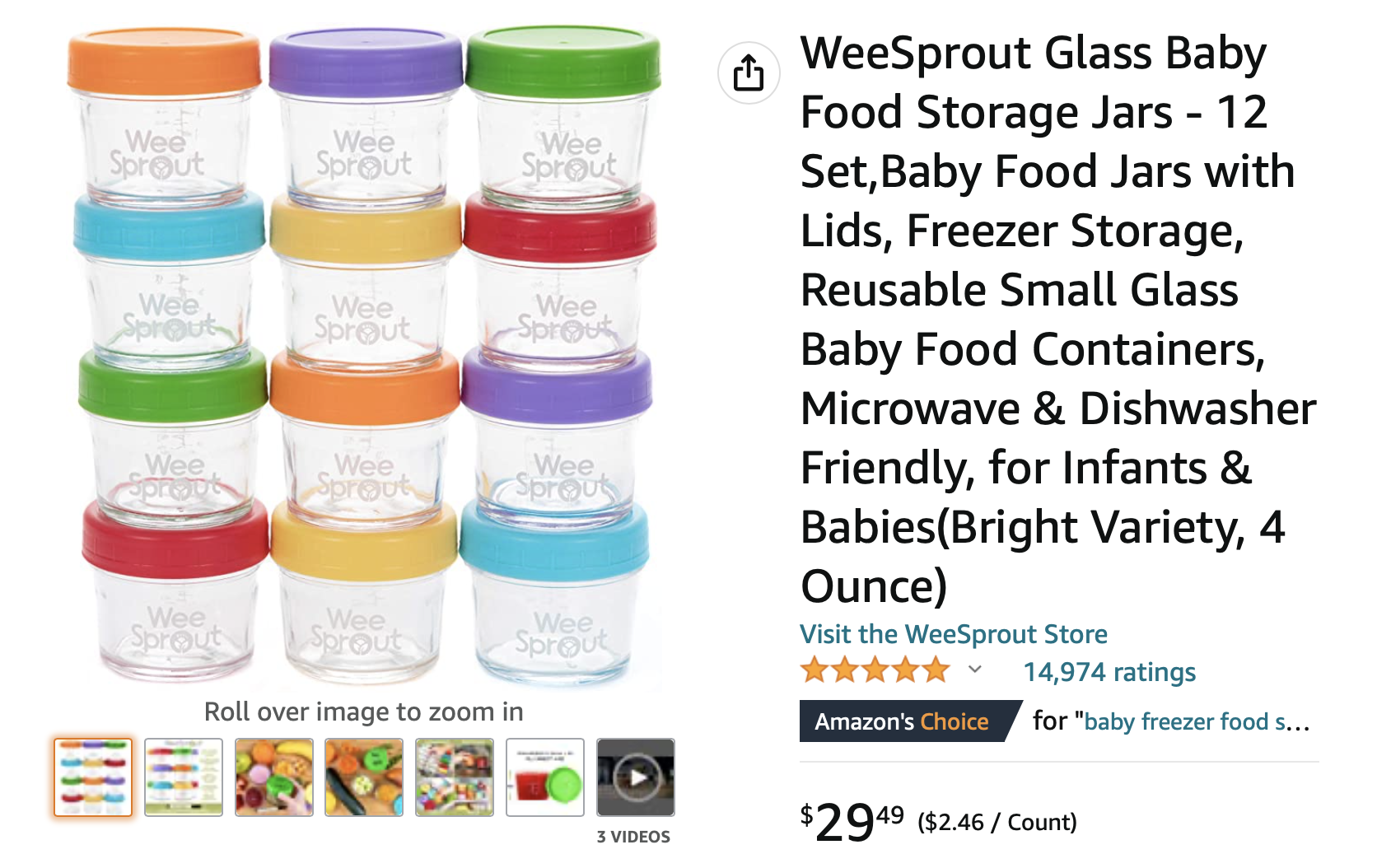
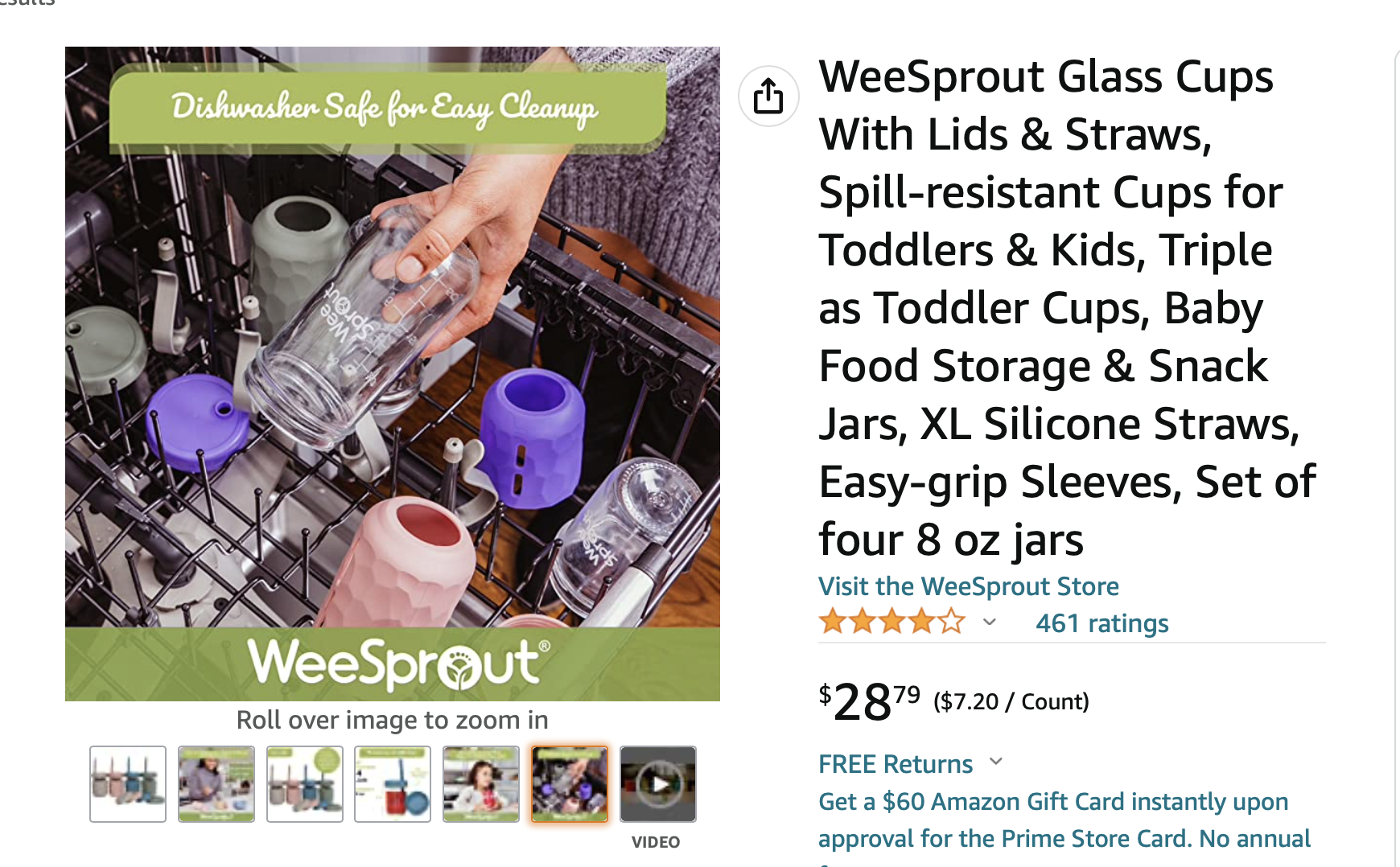
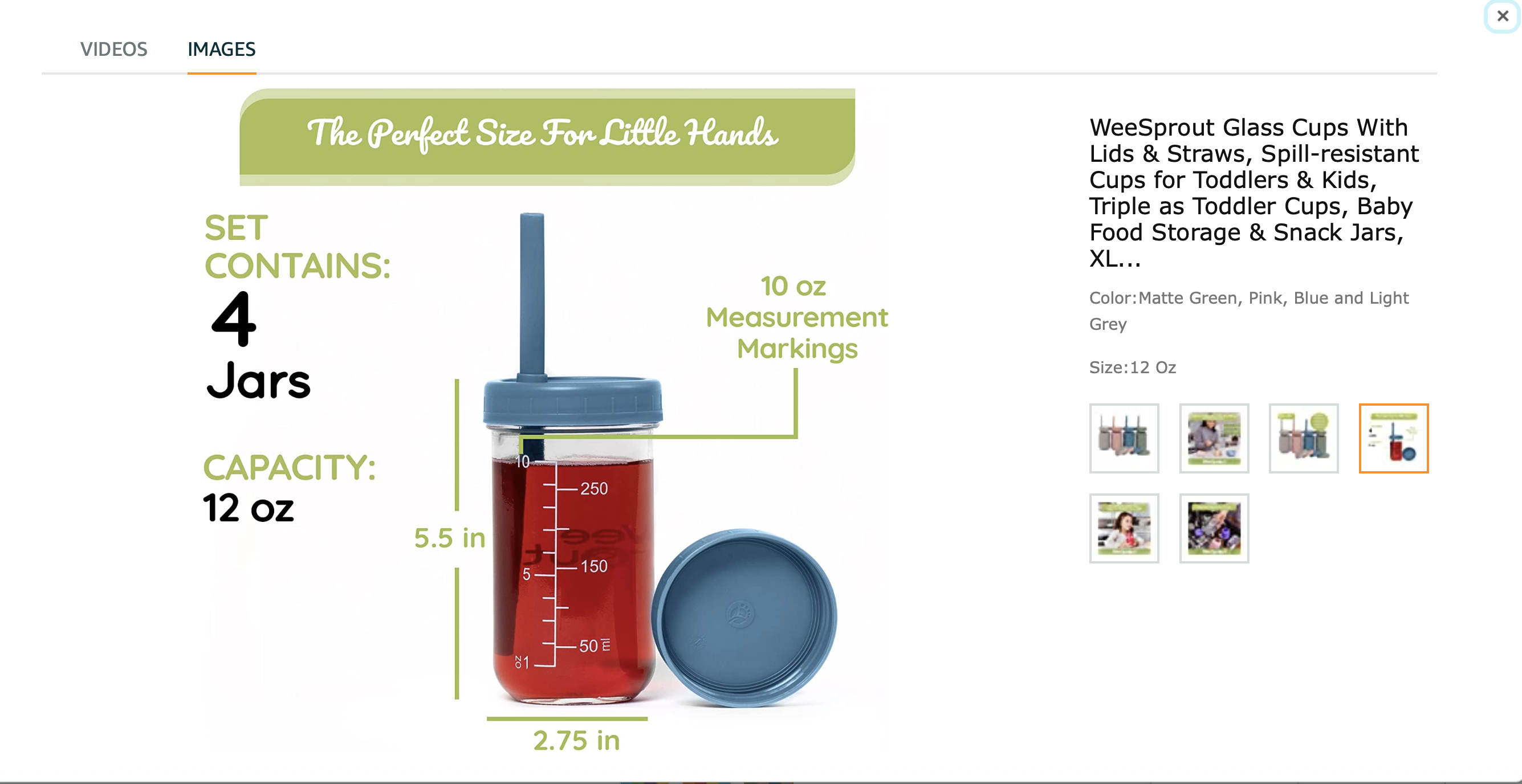

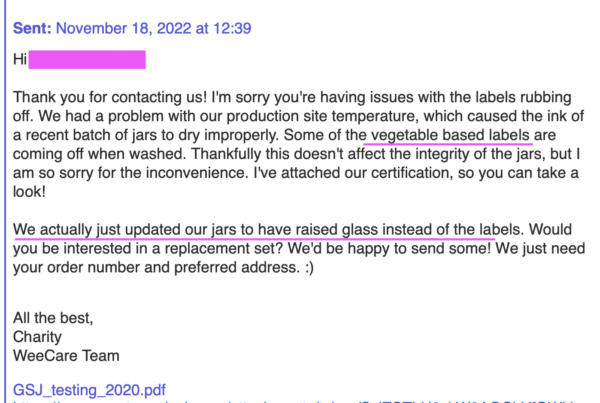

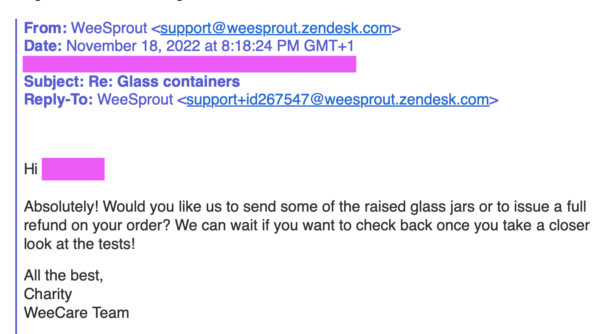
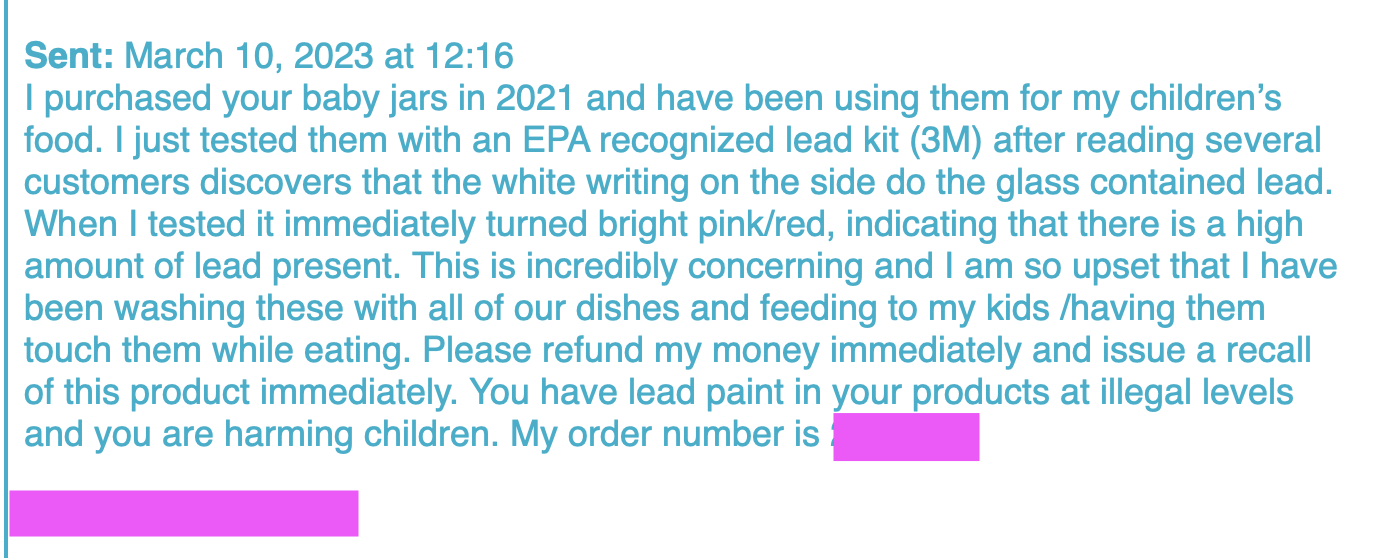
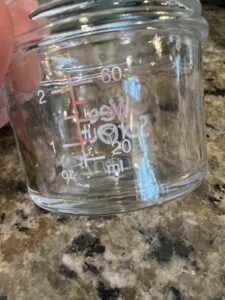
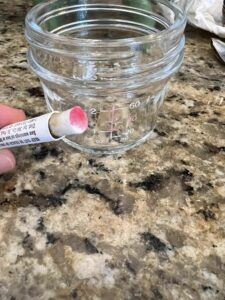
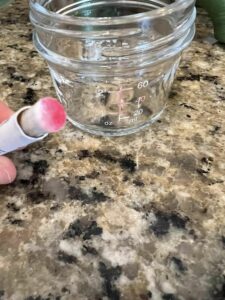
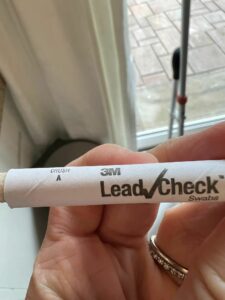
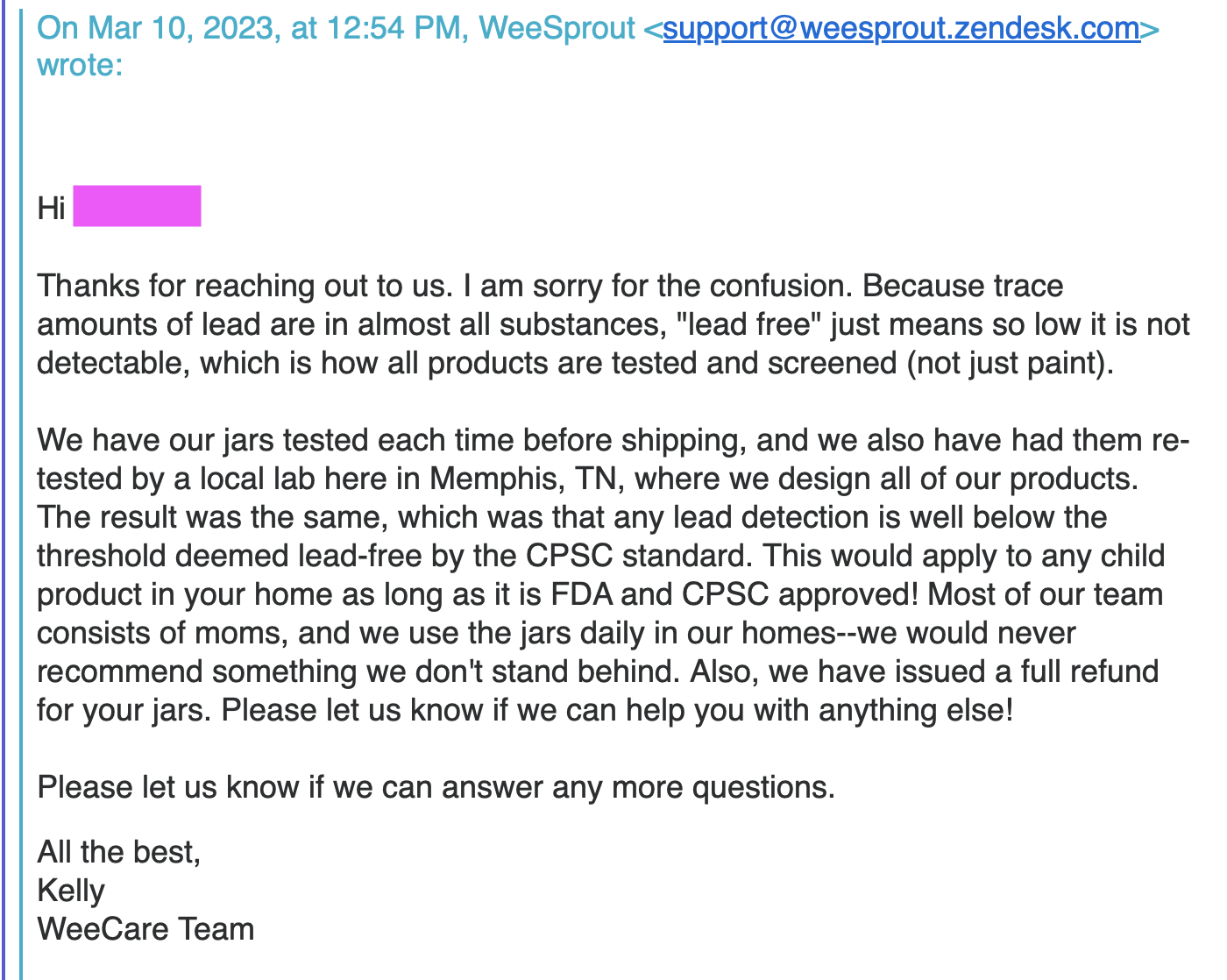
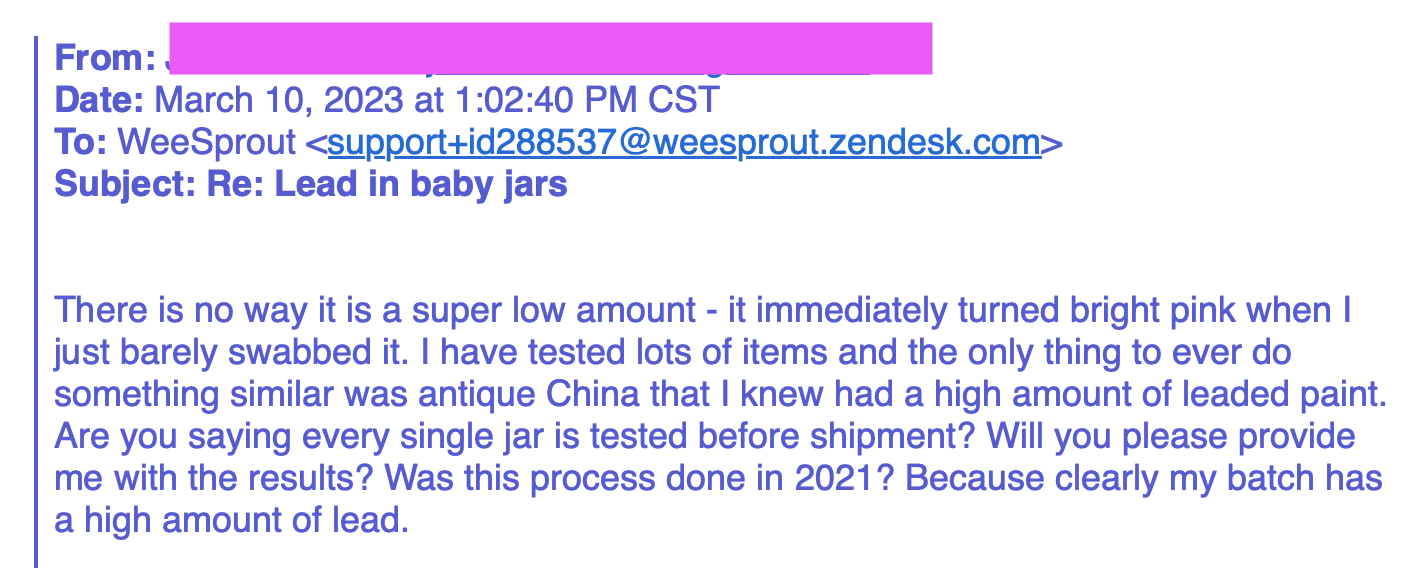
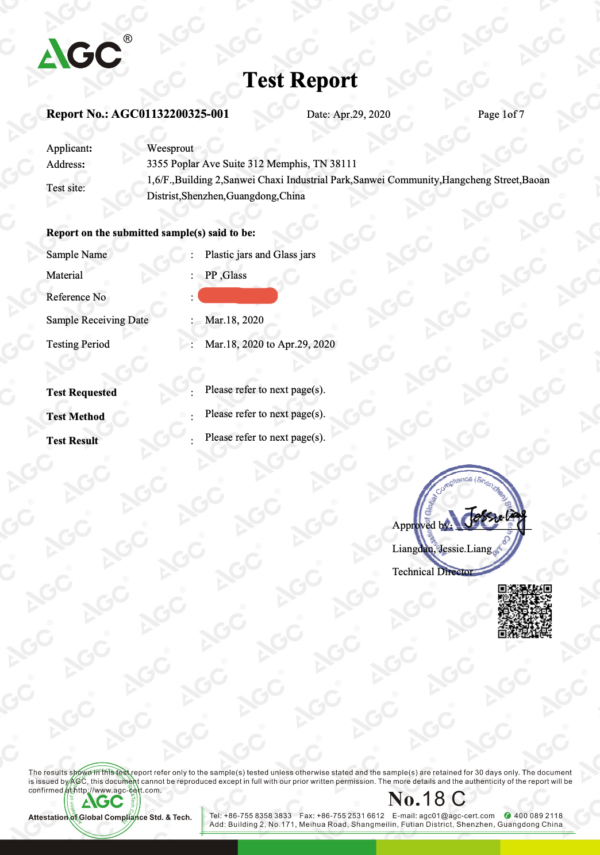
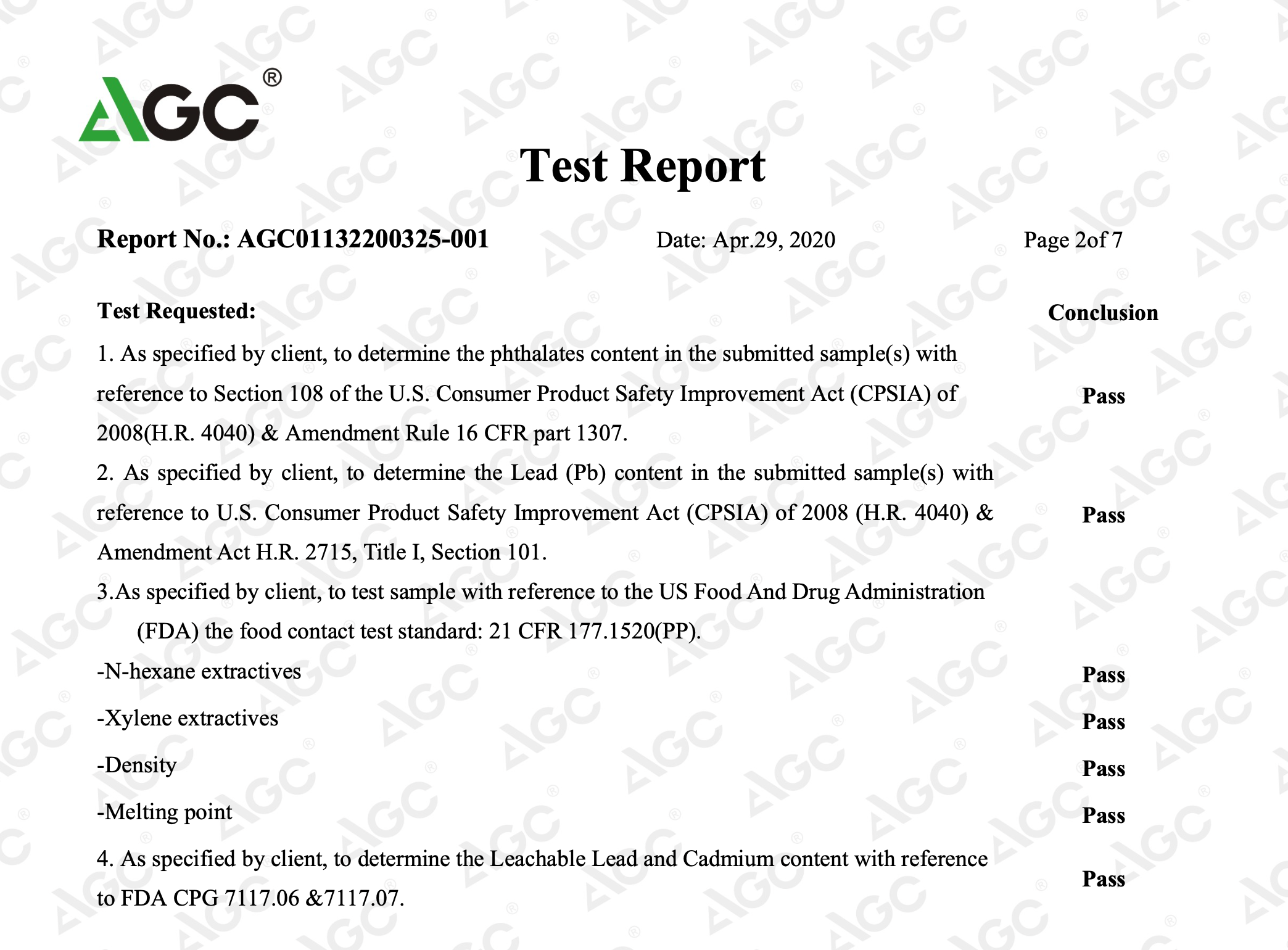
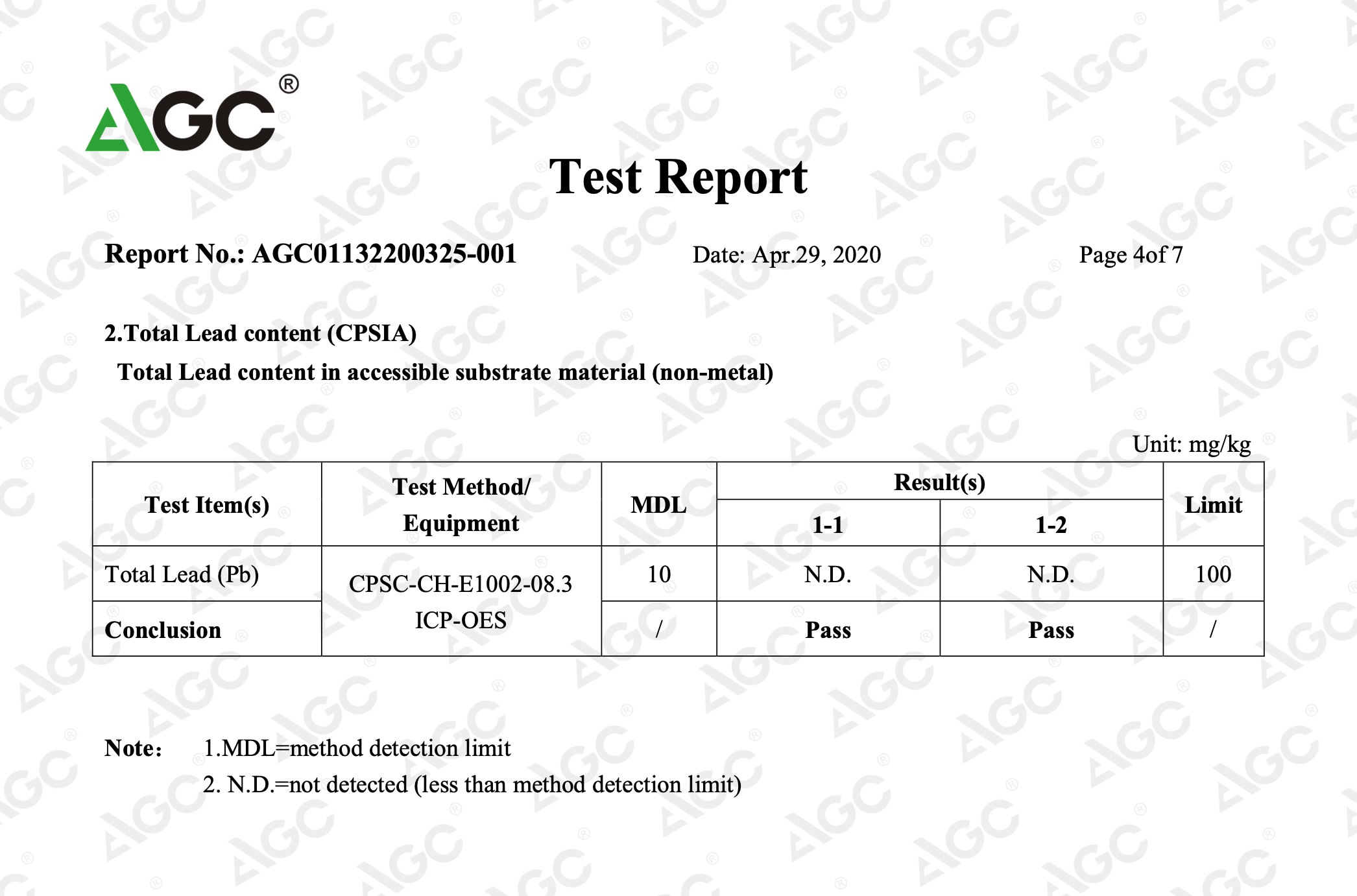
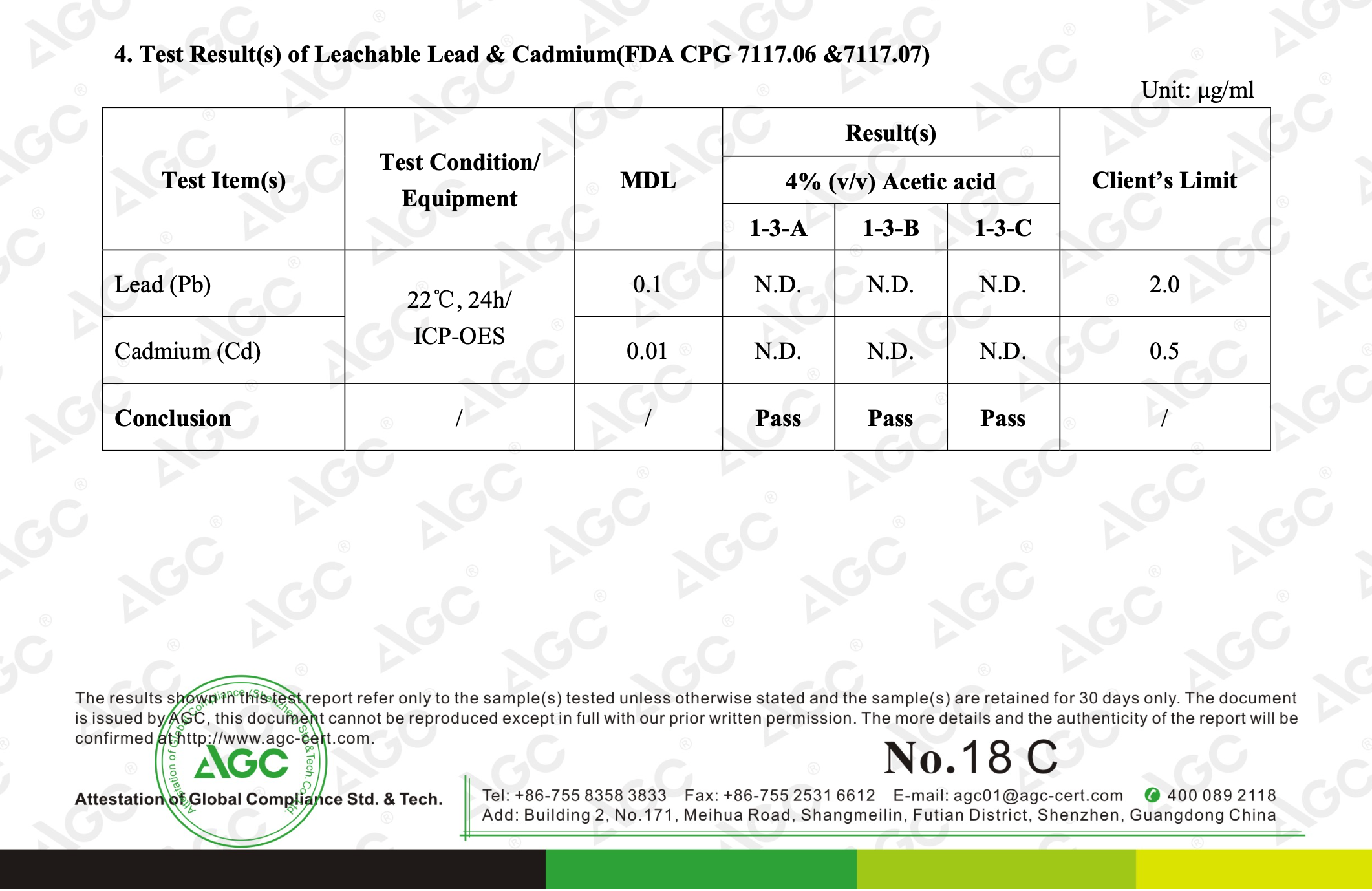
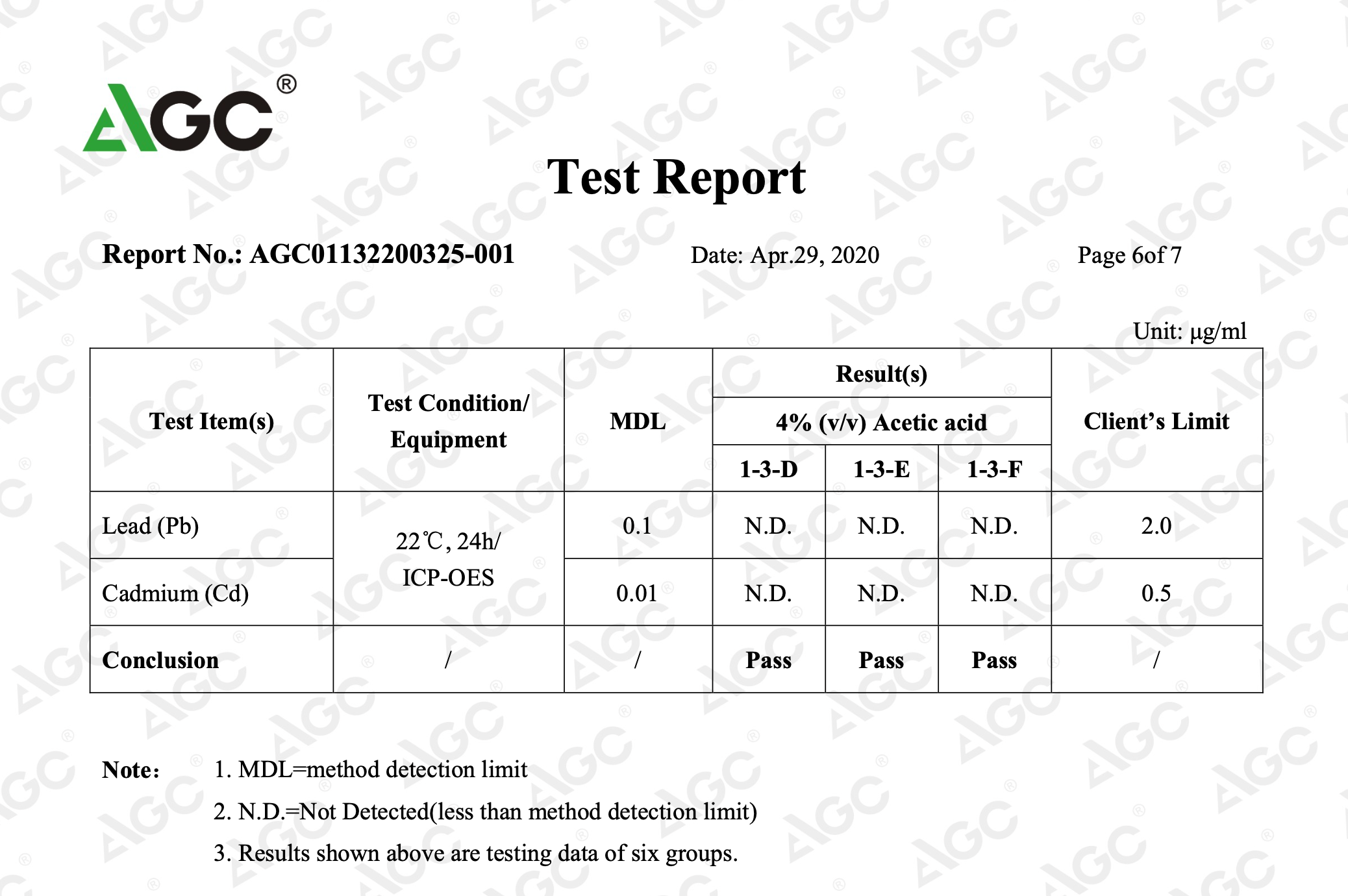
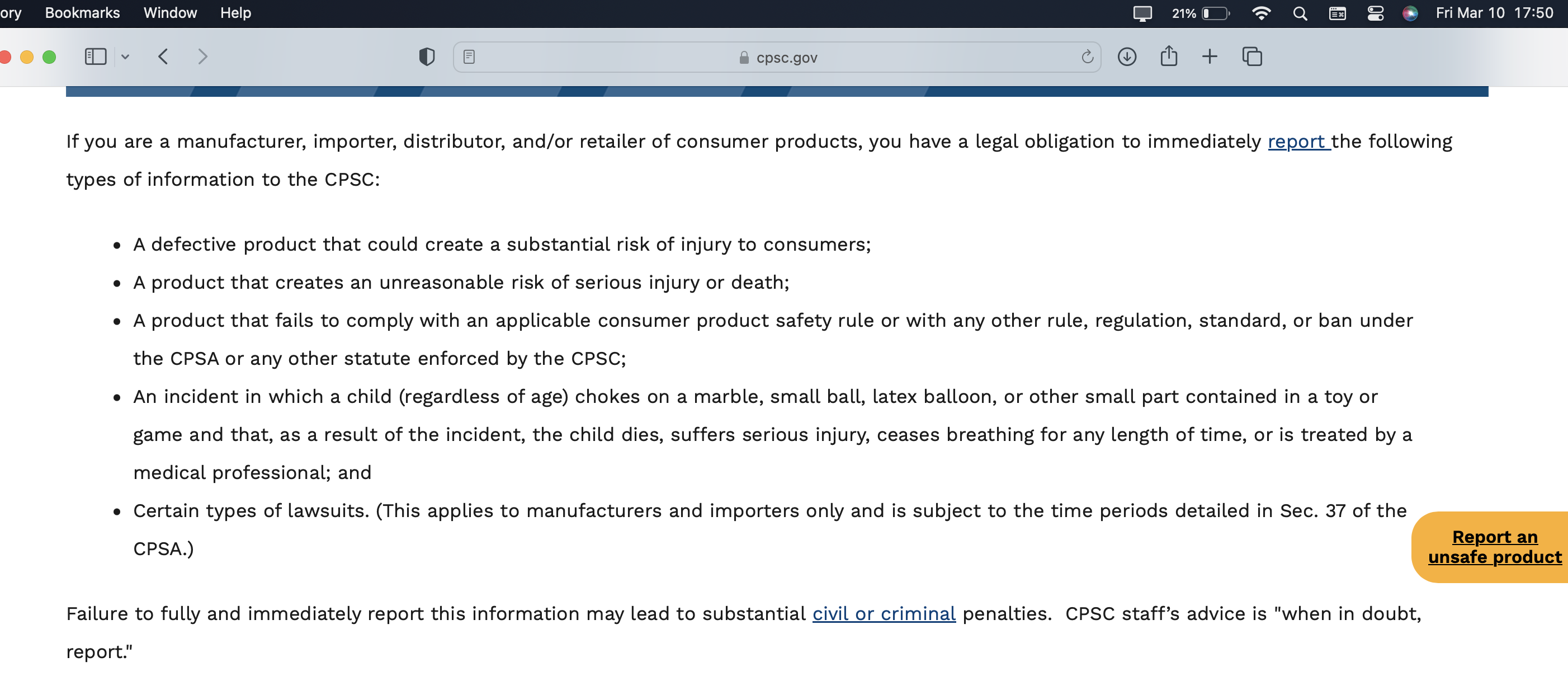
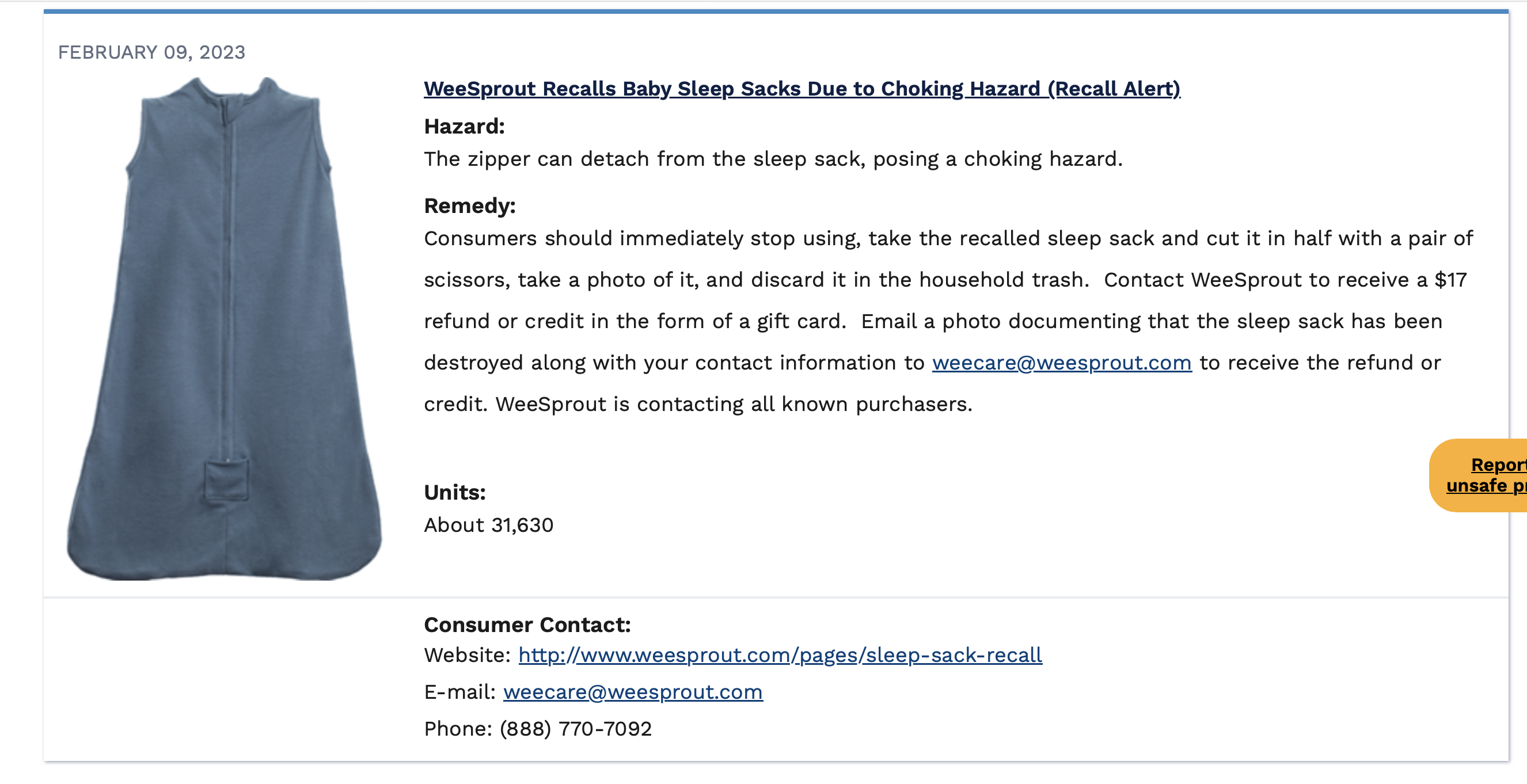
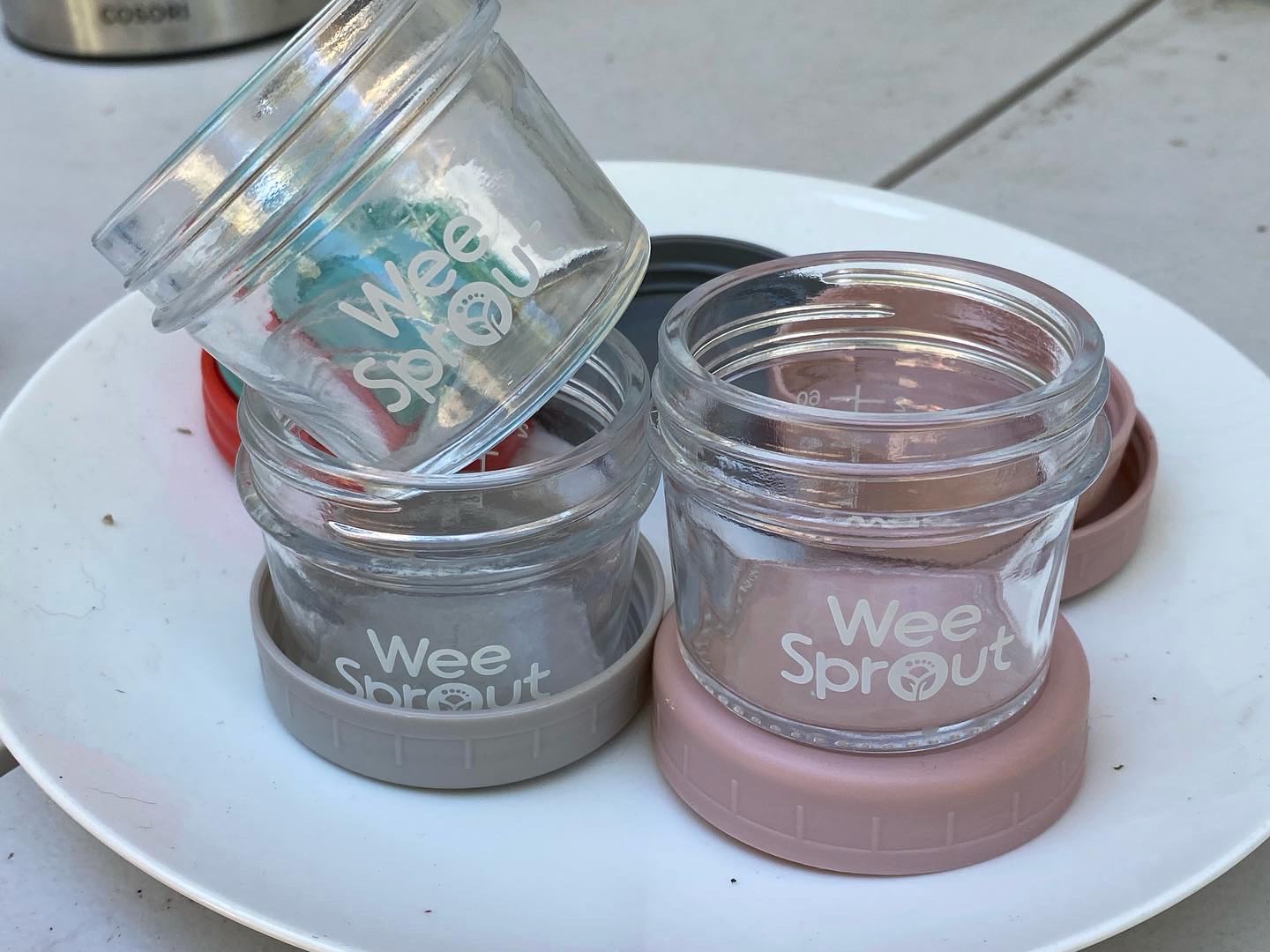

I also purchased Wee Sprout containers October 2022 and tested my containers for lead (early March 2023) using an 3M’s EPA certified lead test. The containers were purchased from Amazon and were positive for lead so they’re still being sold as of a few months ago.
Thank you so much for this information.
I found your article after testing my WeeSprout Jars. Thank you for the in-depth research. I have filed with the CPSA & FDA.
This is so disappointing. I just purchased these jars from Amazon to use for my 6 month old’s food which I make at home. I was looking for a high-quality storage container and was not aware of this. I will be returning these and I am contacting the company as well. Thank you for the work you do.
Did they arrive with painted markings?
T
Oh this is so frustrating! Have you done any tests with older jars? I bought these in October 2021 (the primary color version) and have been using them almost every day for 2 years.
I just used some 3M testing swabs on them, and they did not react, but I have not had the best luck with 3M testing swabs (sometimes my test confirmation card doesn’t react?) So I’m going to stop using them anyway.
Thanks for everything you do 🙂
Will you test haakaa jars?
haakaa Baby Food Storage Containers with Silicone Lid, Freezer and Microwave Safe,
https://www.amazon.com/dp/B09YYBKSK9?ref_=cm_sw_r_apin_dp_P3F2HQCDQ14M6RN6ESR3_1
Dear Tamara,
Thank you for your work. I am shocked to find out about WeeSprout as I have been using them for milk and food storage since 2021 for my baby daily. What do I do? Should I test her and the whole family for lead?
Also, would you be able to test the BEABA Baby Food Storage Jars made from glass?
All the best,
Anna
Definitely get the family tested for Lead – and call Wee Sprout and ask for a replacement Lead-free version of the product (which they make now) or a refund. Read this:
https://tamararubin.com/2019/02/blood-lead-testing-please-get-everyone-in-the-family-tested-since-you-have-been-living-in-a-house-with-high-lead-paint/
and watch my film (so you are fully educated on the subject):
https://tamararubin.com/2023/01/a-link-to-my-film/
Hi, I have many of the jars but most of them had the issue of the paint coming off and I had gotten a refund for them when I first purchased them. Would there be a concern that there is lead still on the glass if the marks have already washed off?
Yes – there can still be microparticulate lead (at dangerous levels) embedded in the glass if the paint has worn off. Please throw those out.
Hello,
Have you found lead paint in markings/logos on any substrates other than glass eg. plastic or stainless steel?
Thanks!